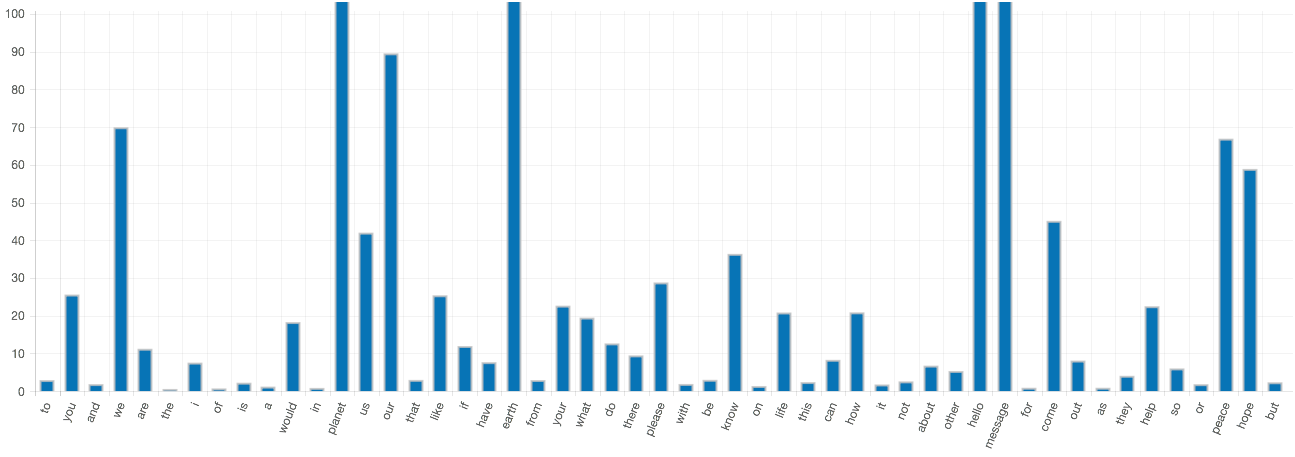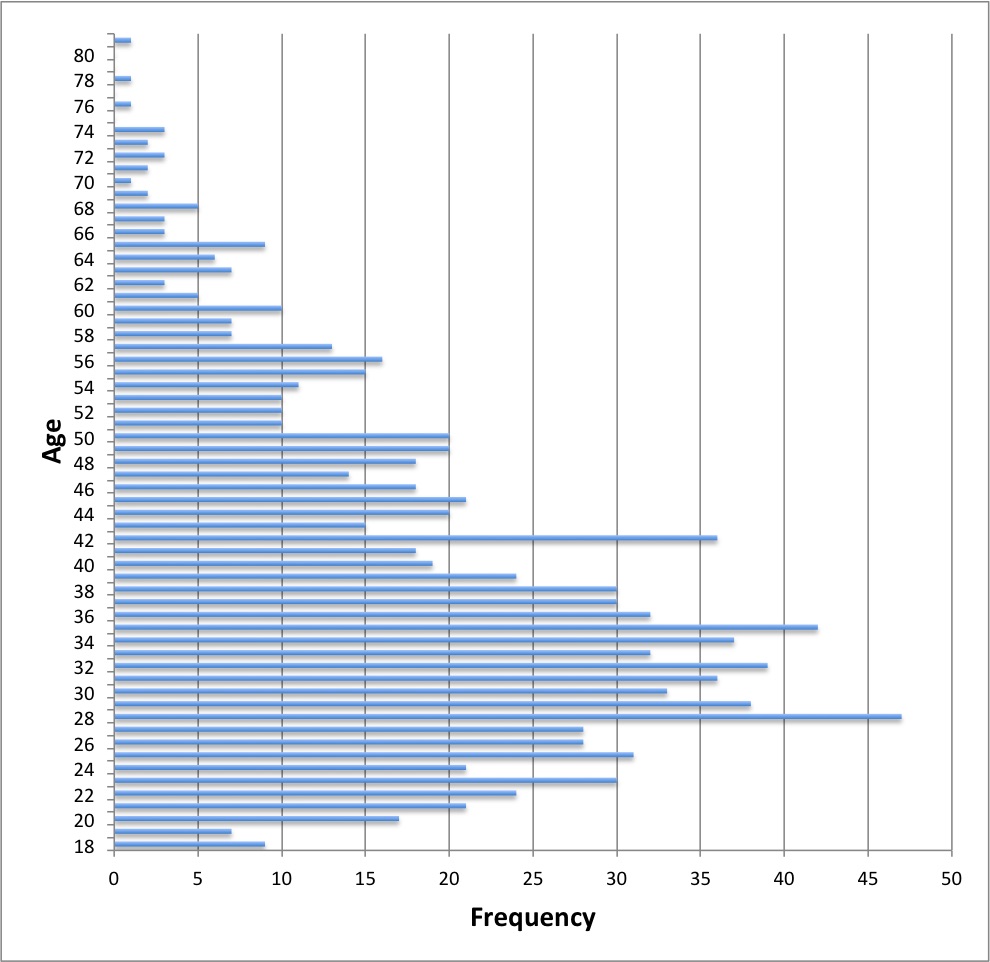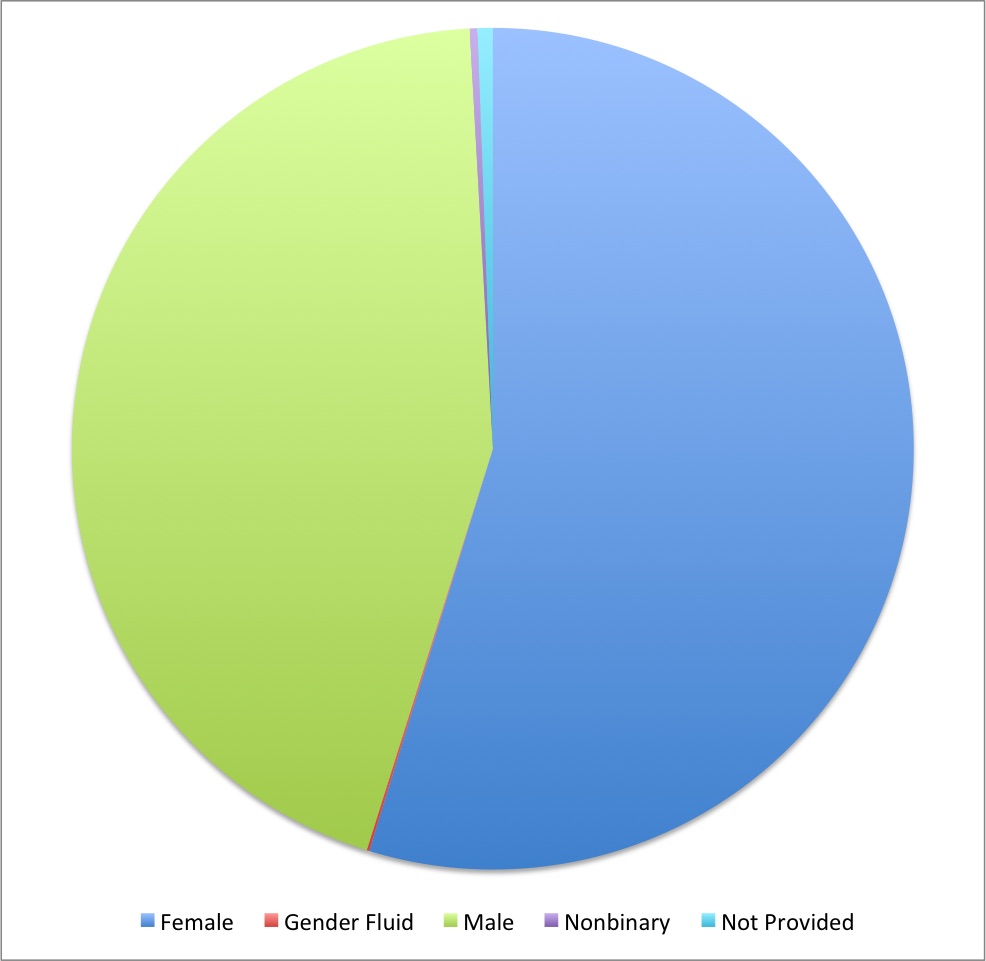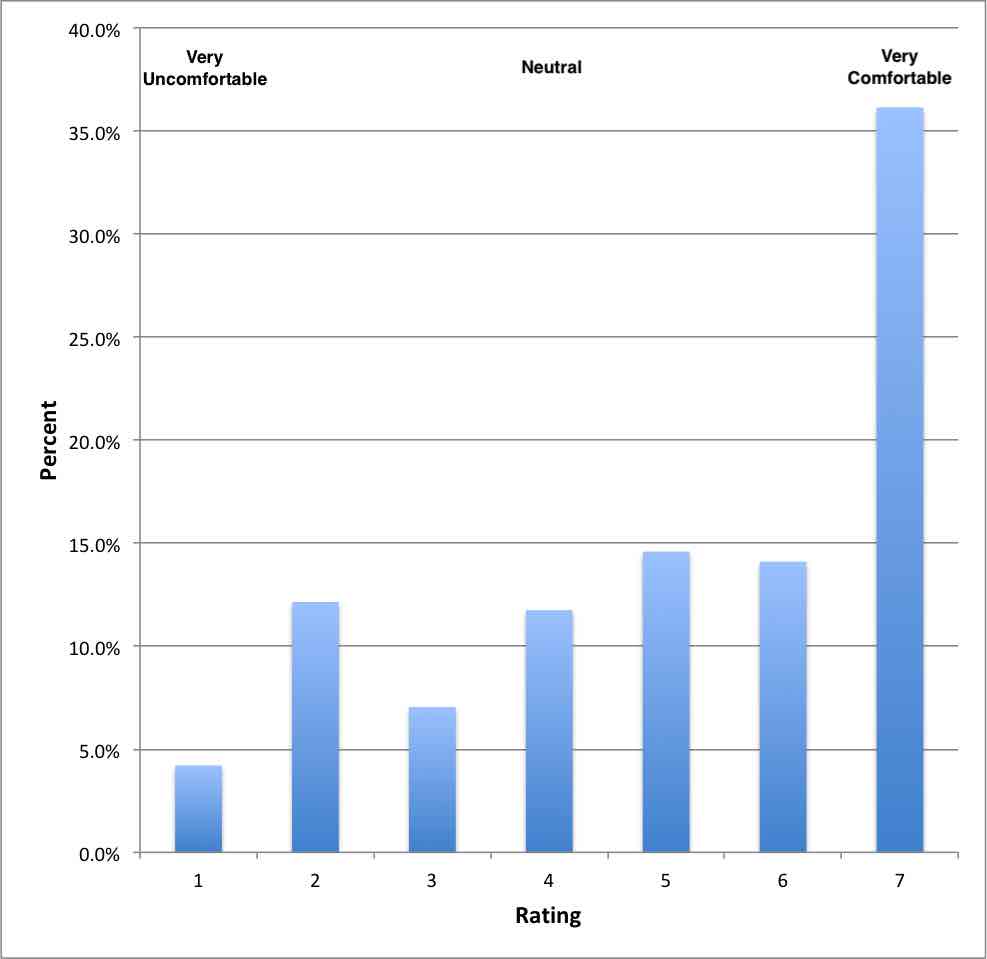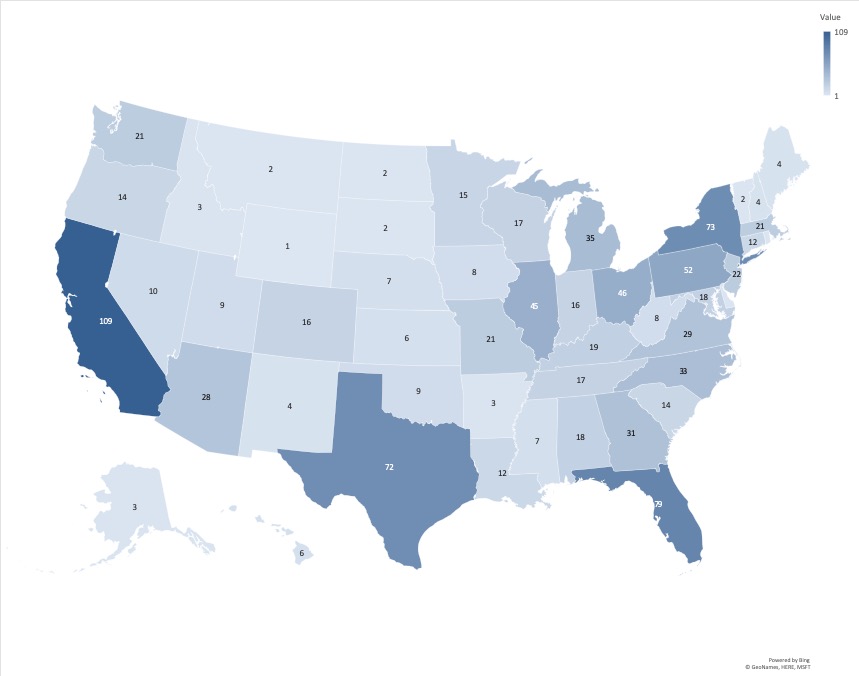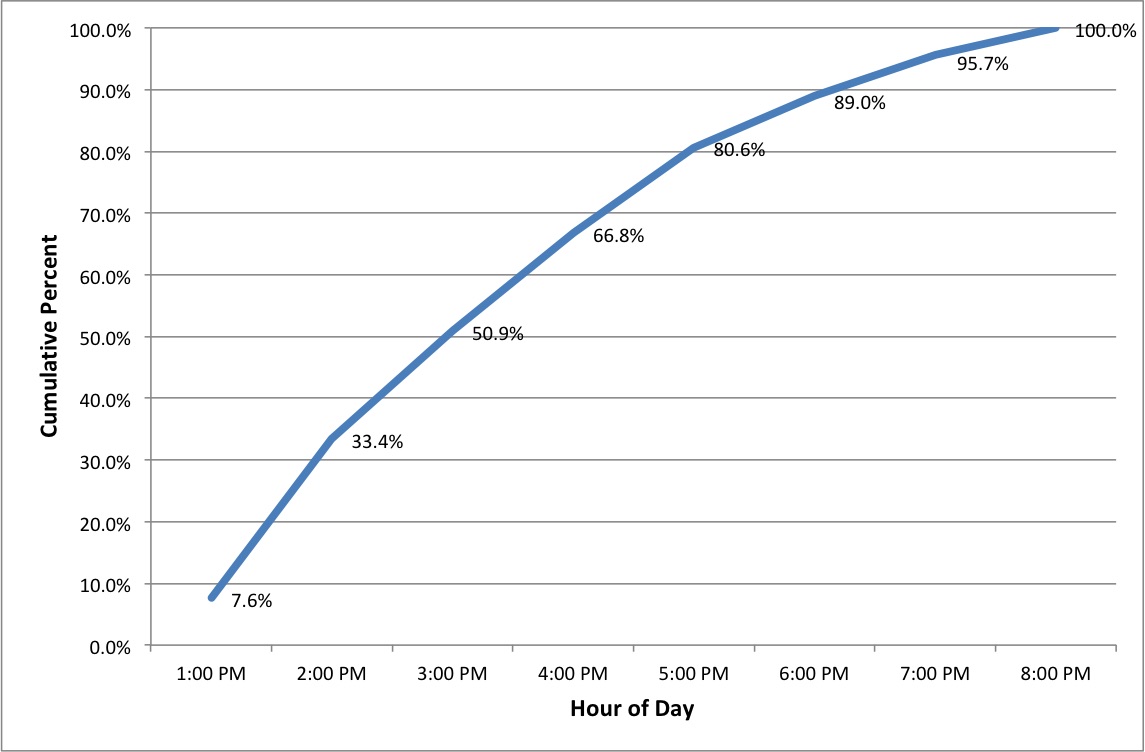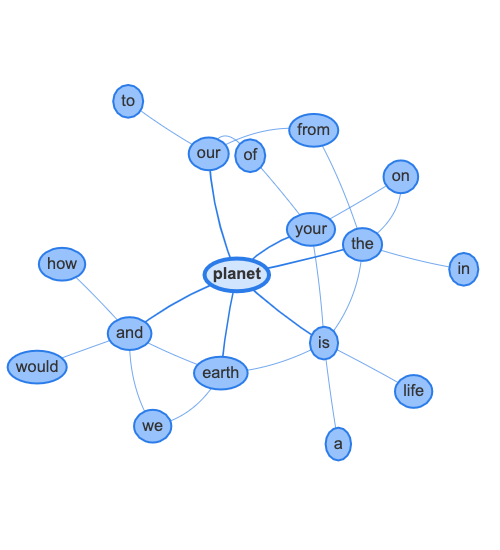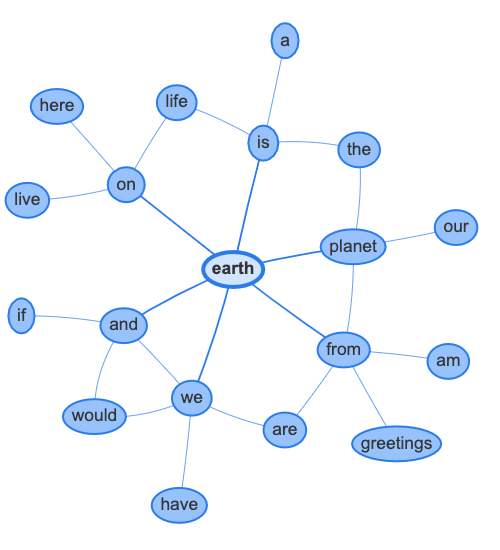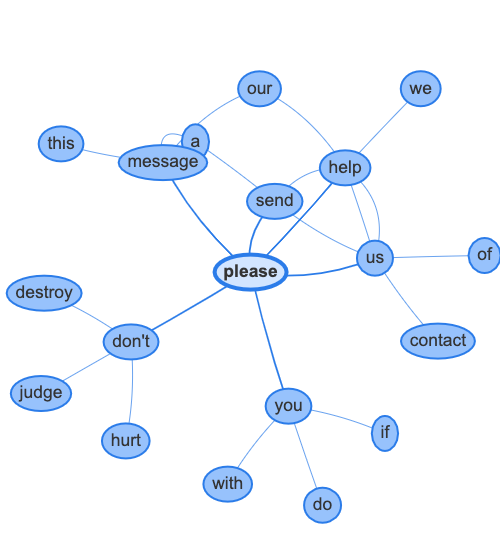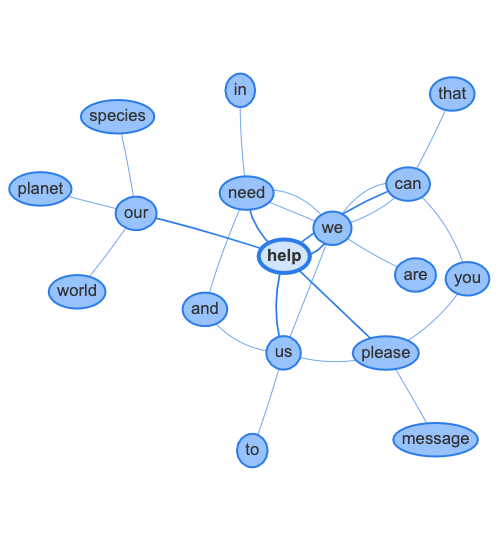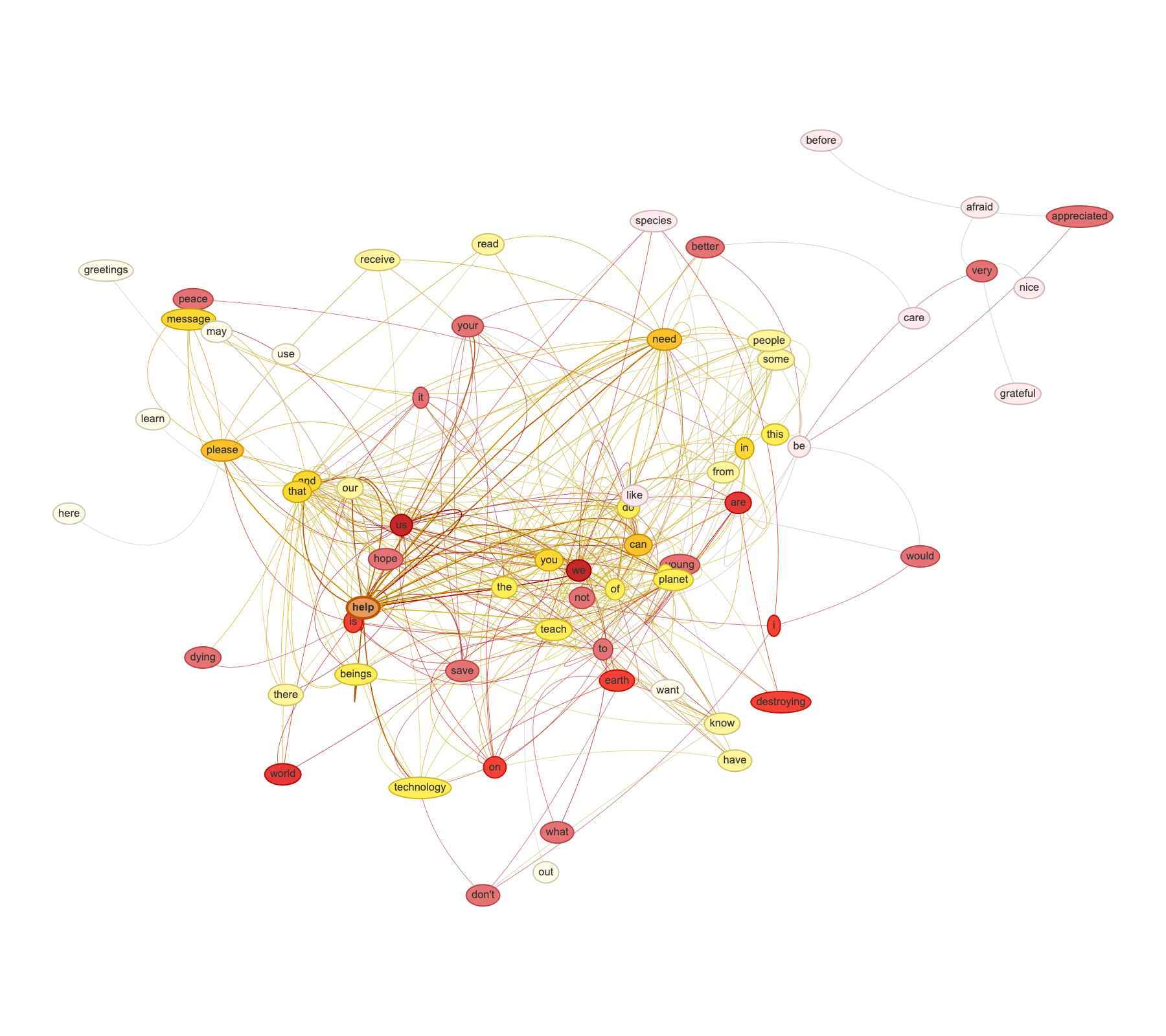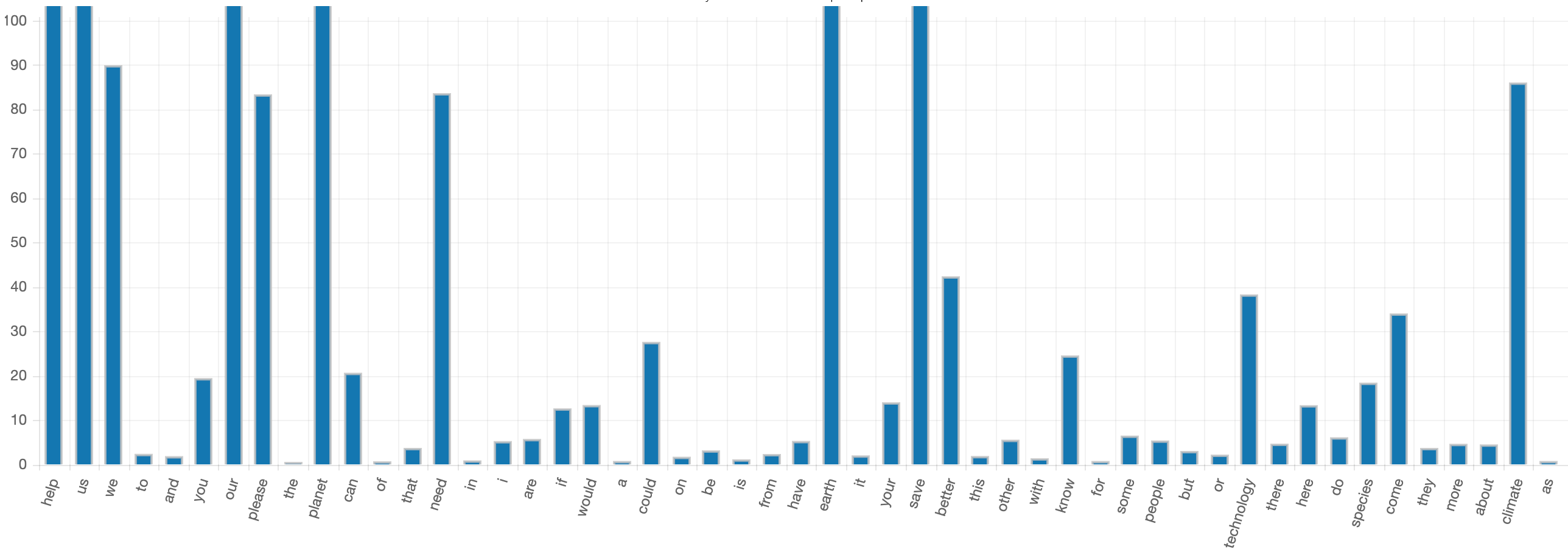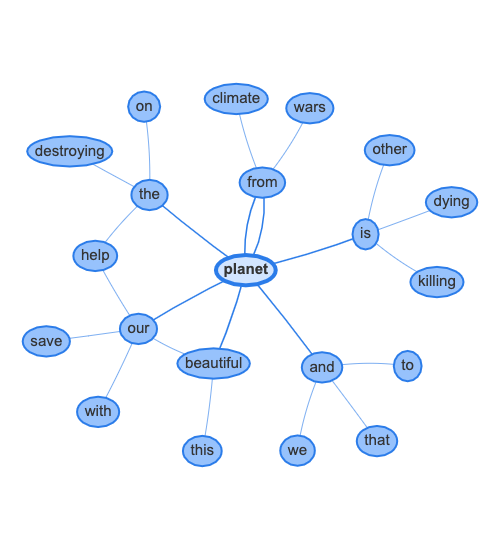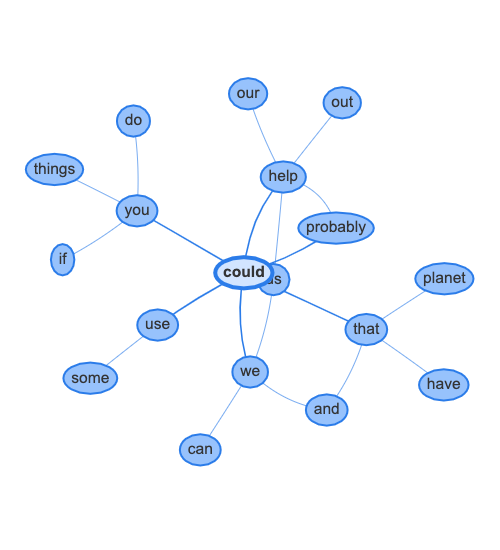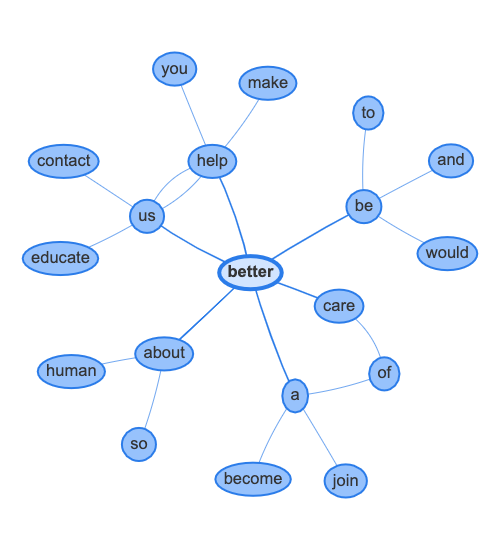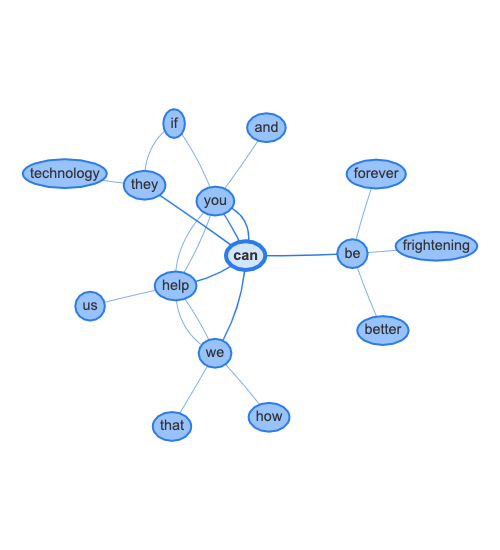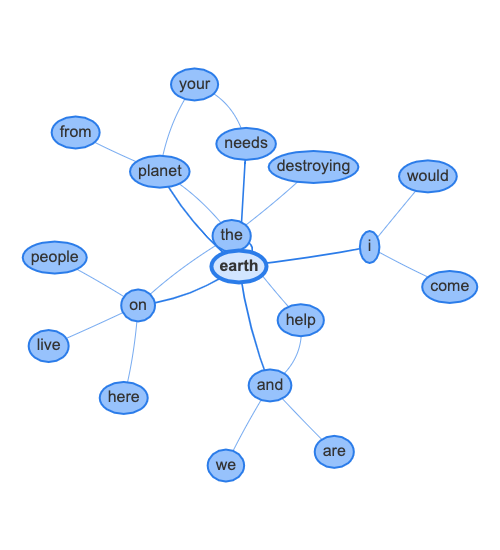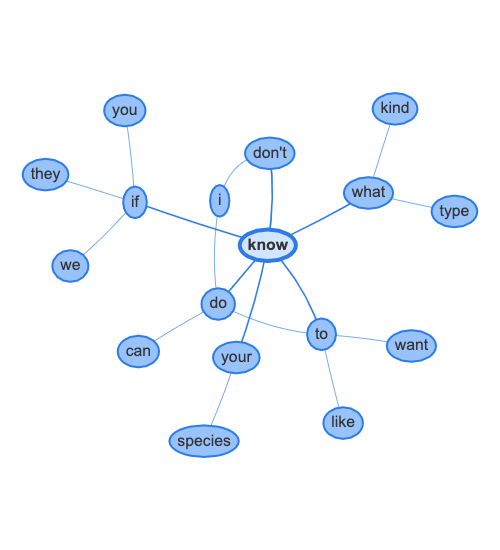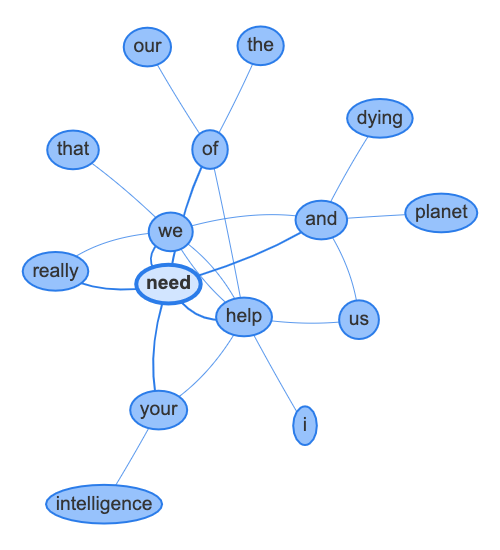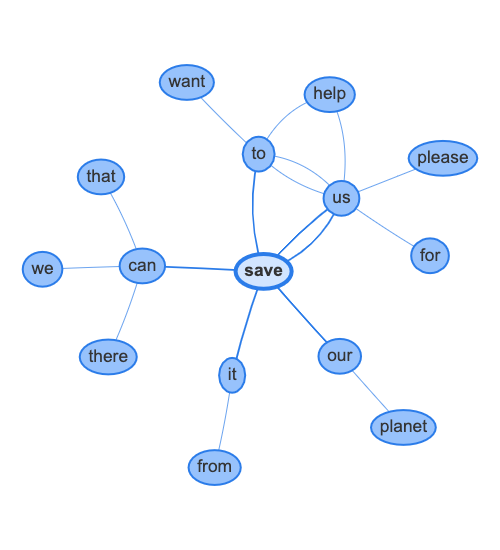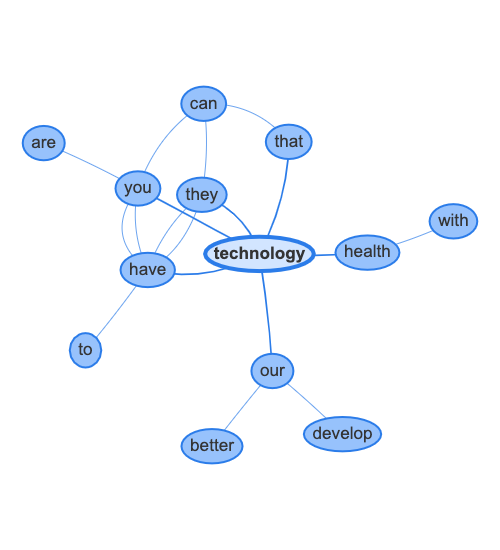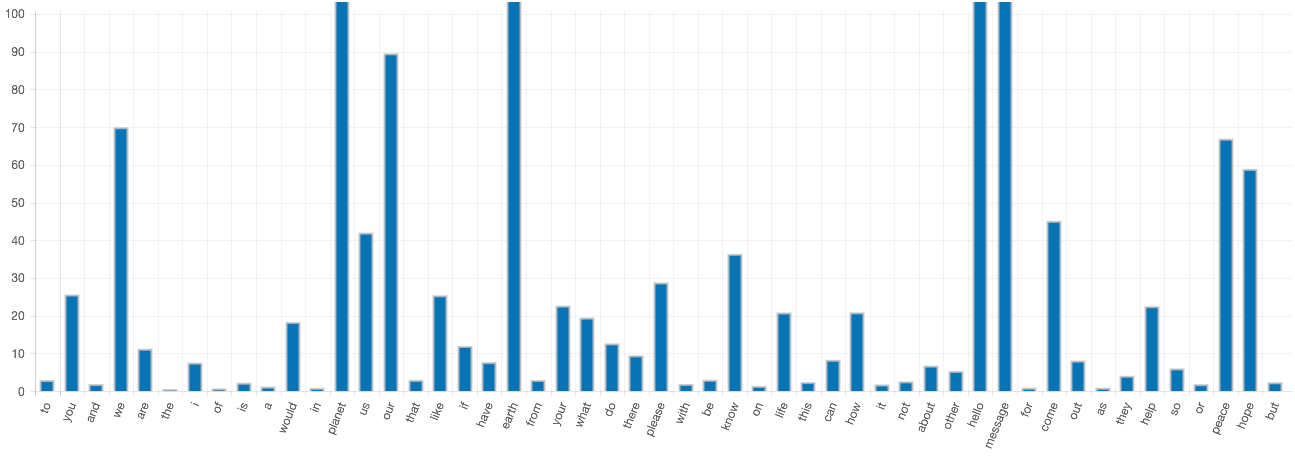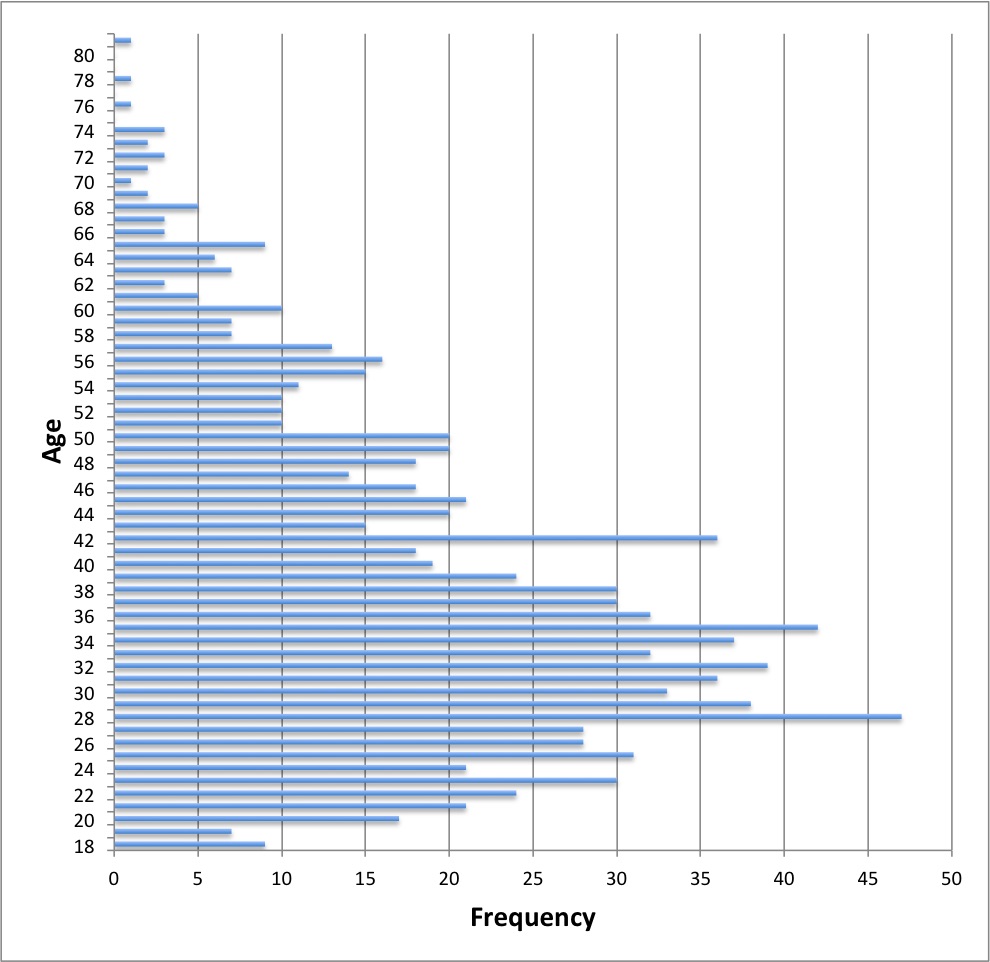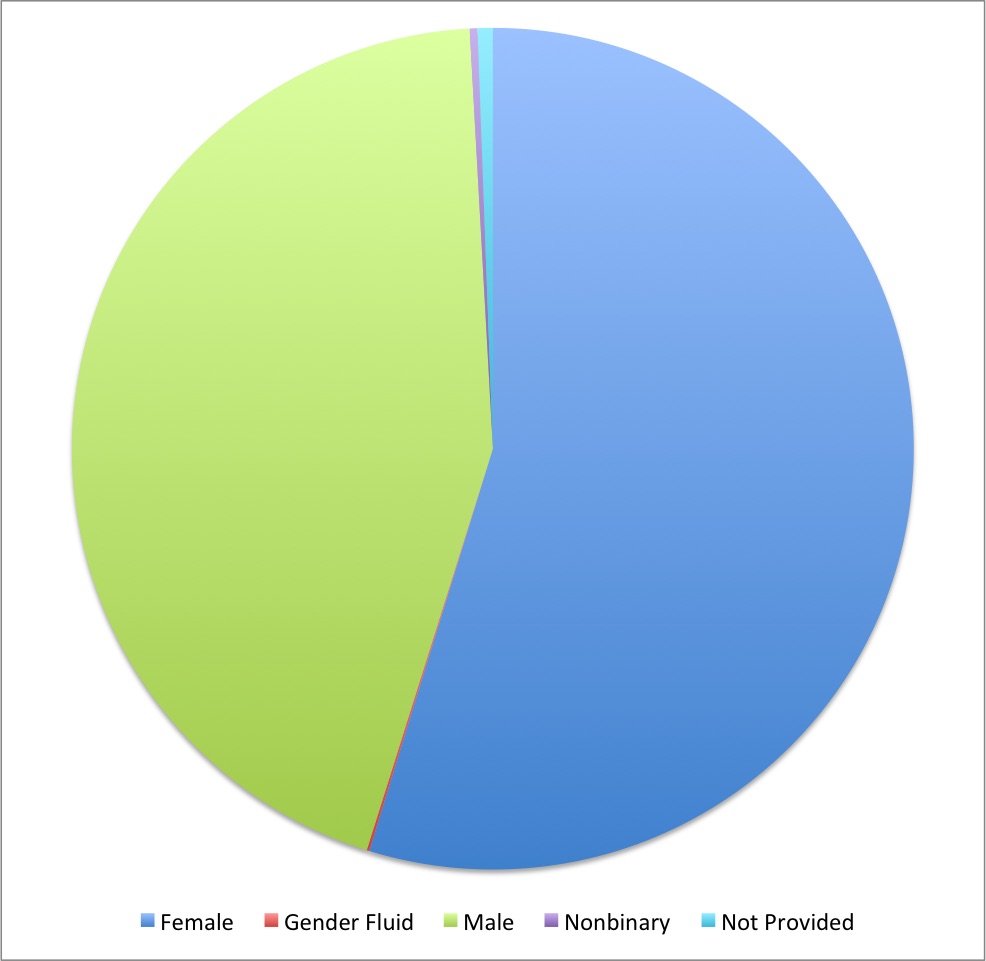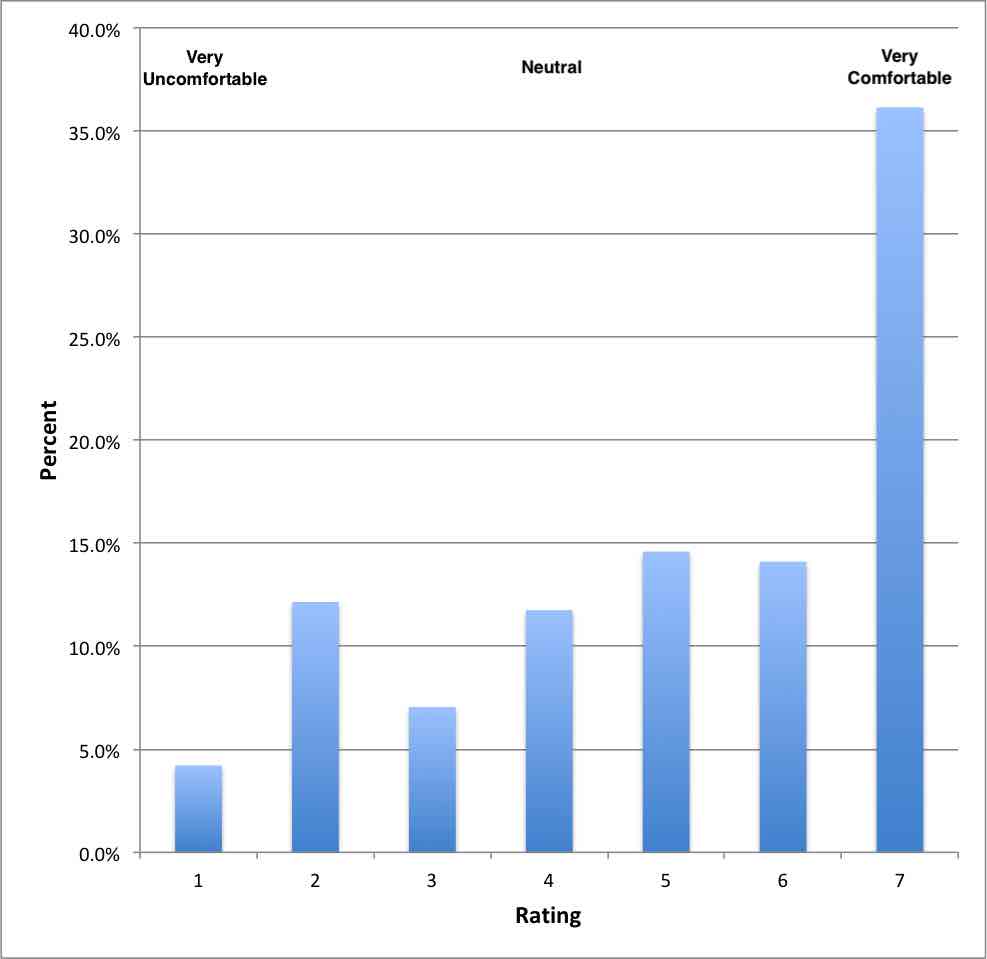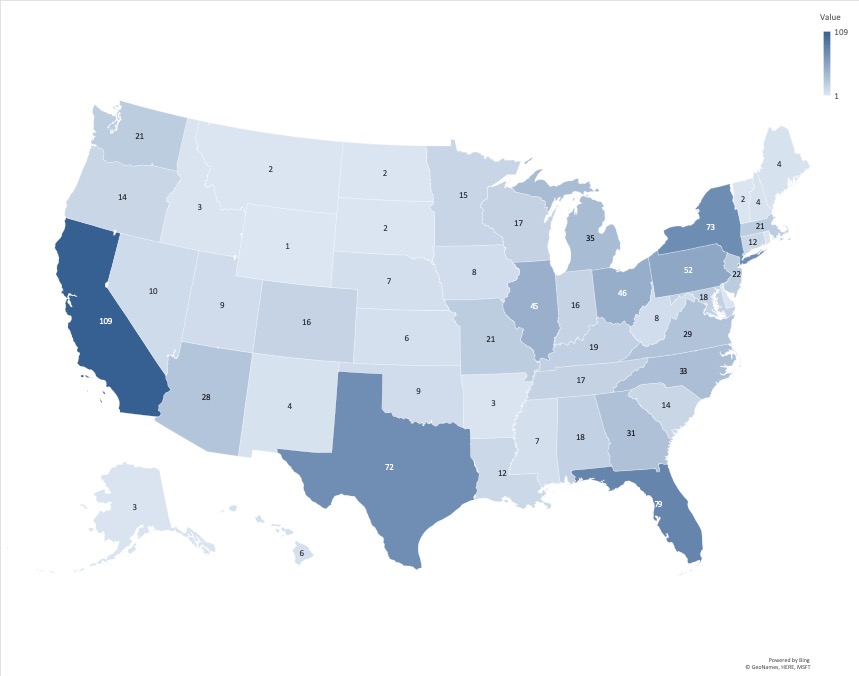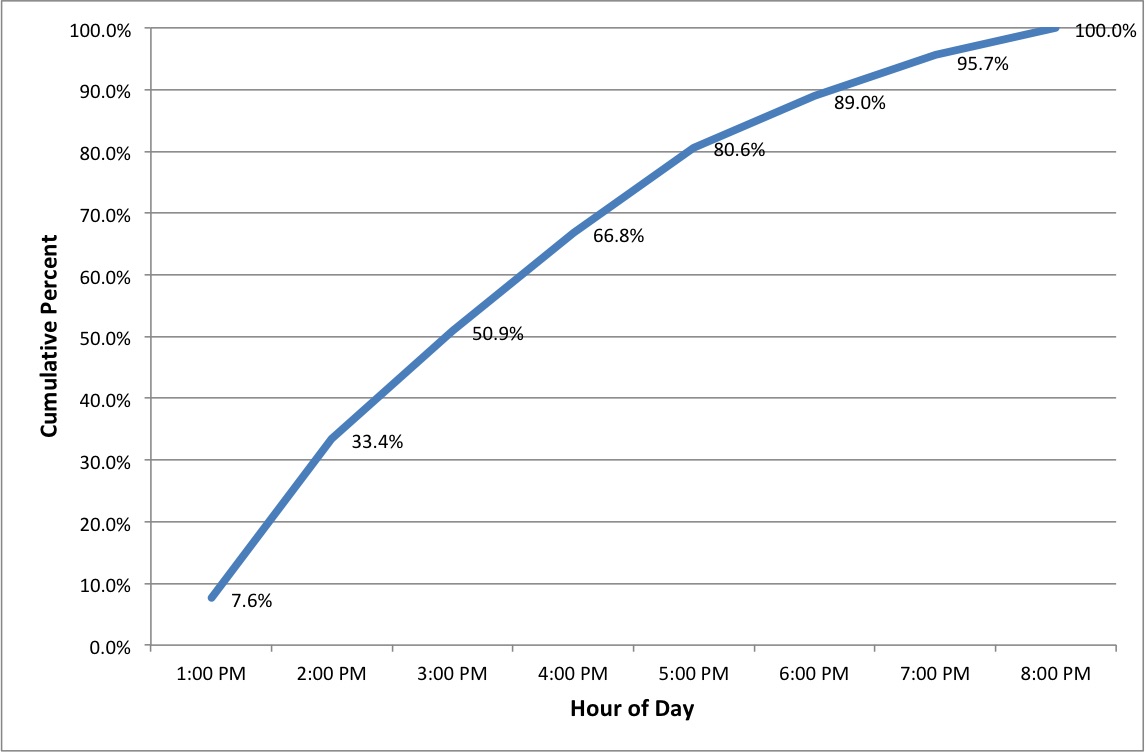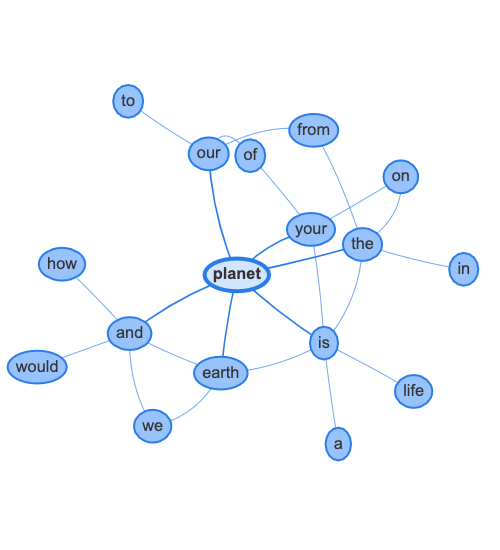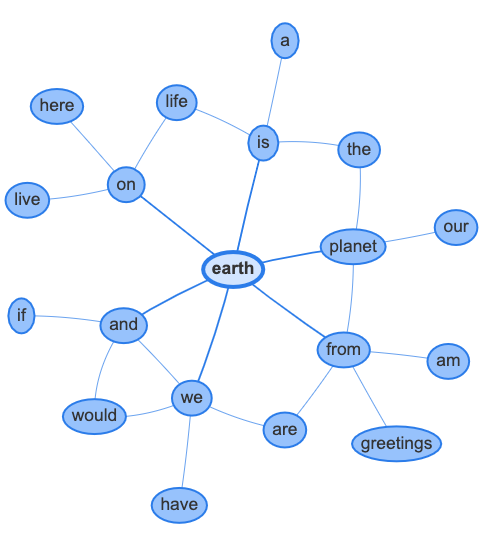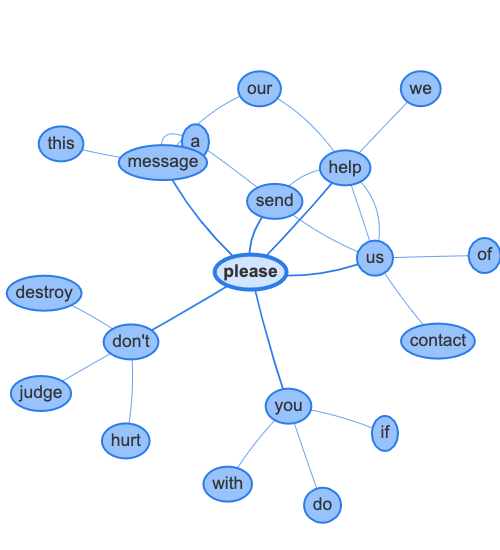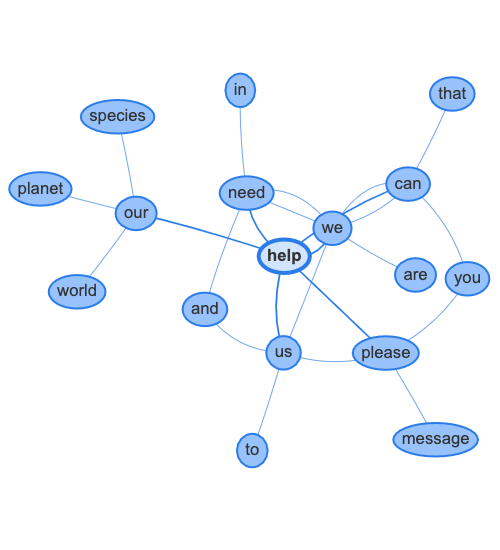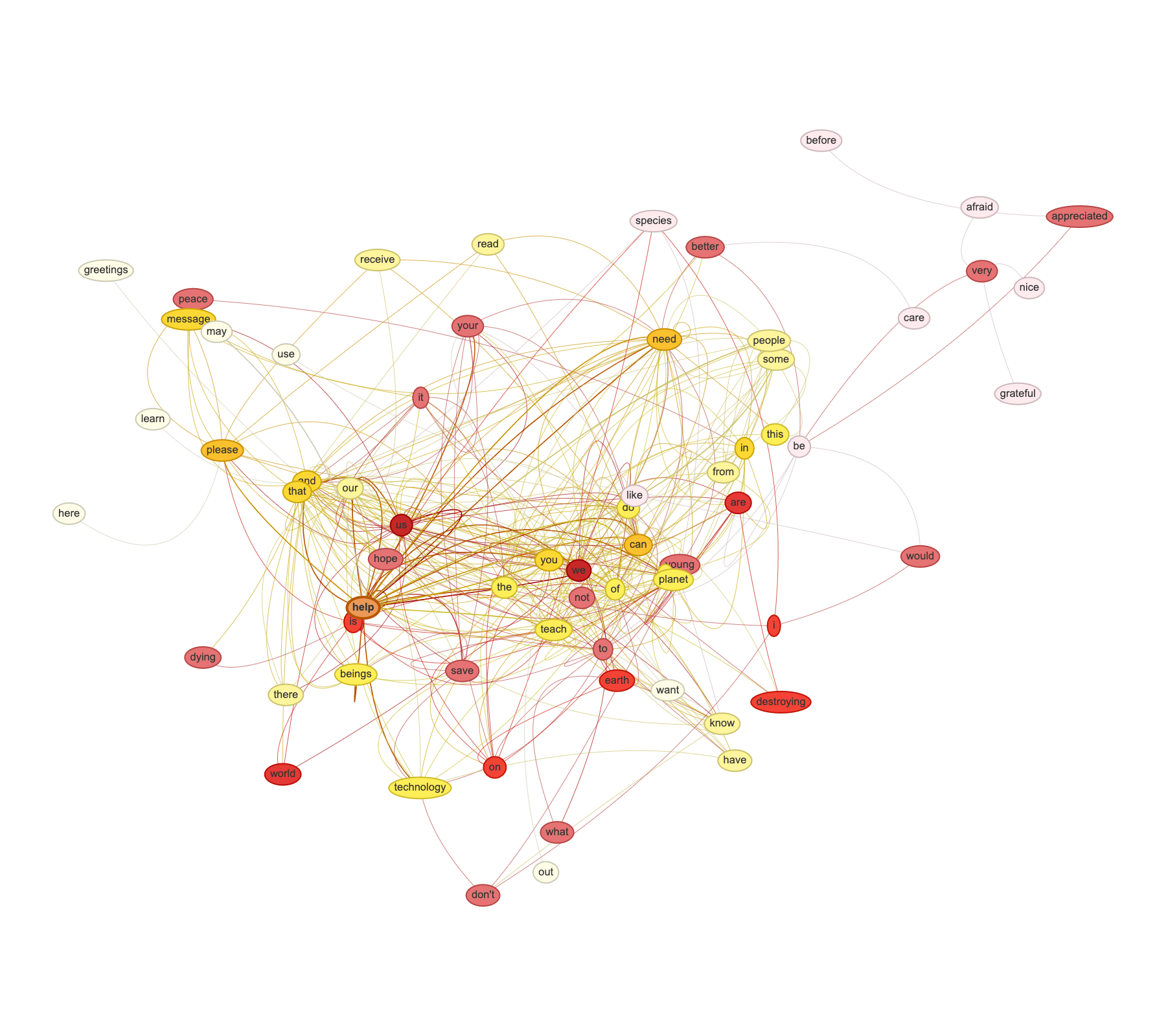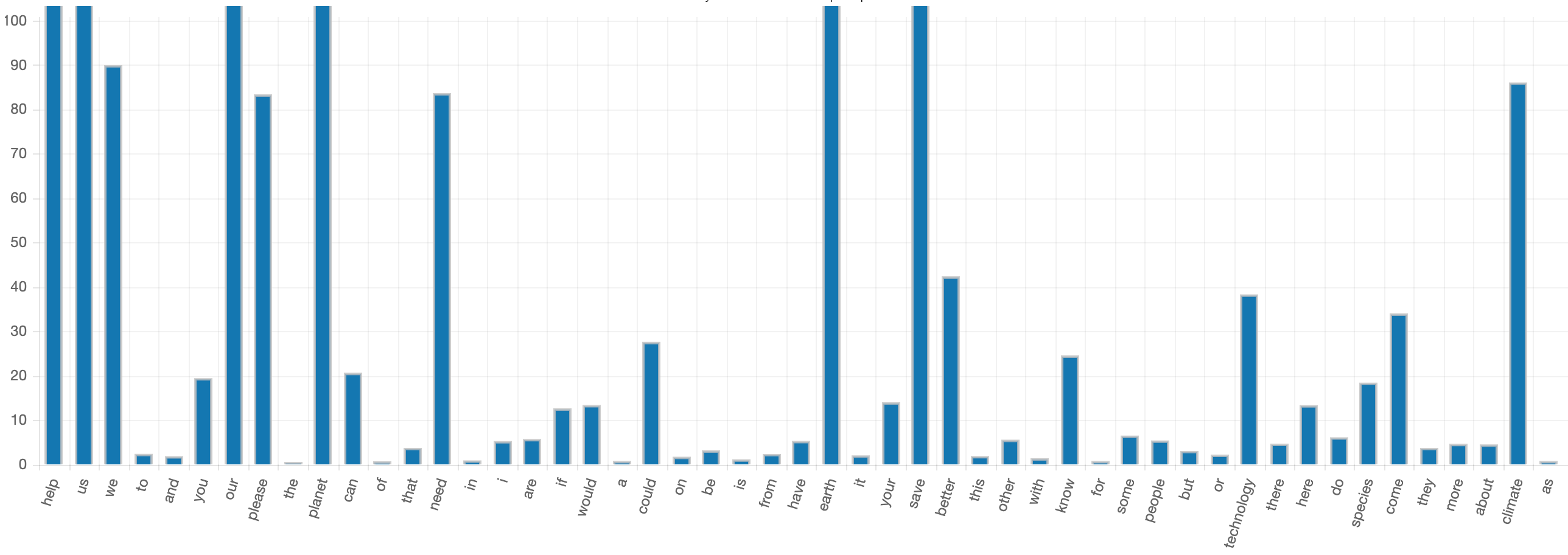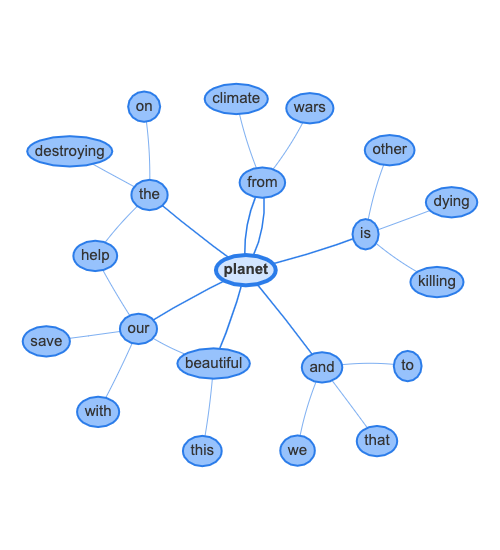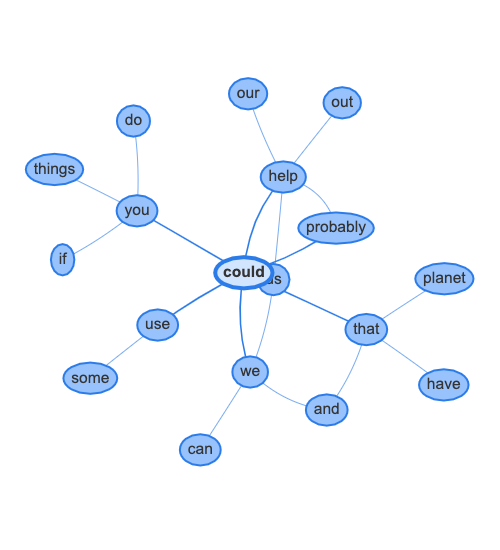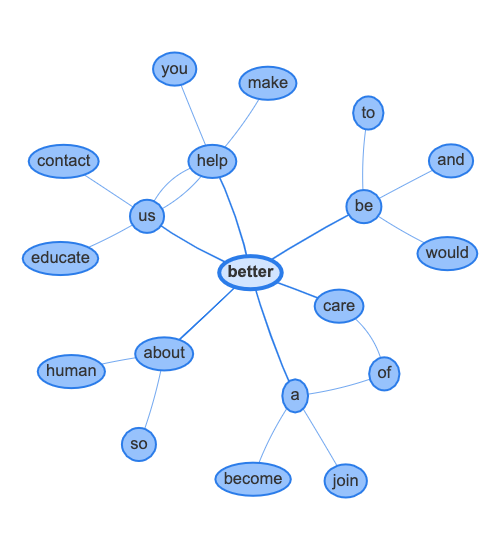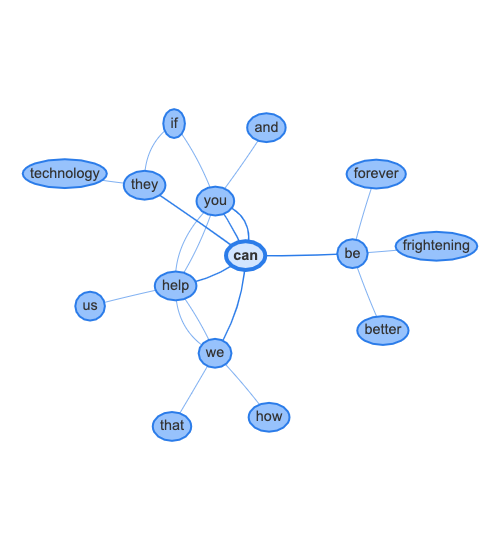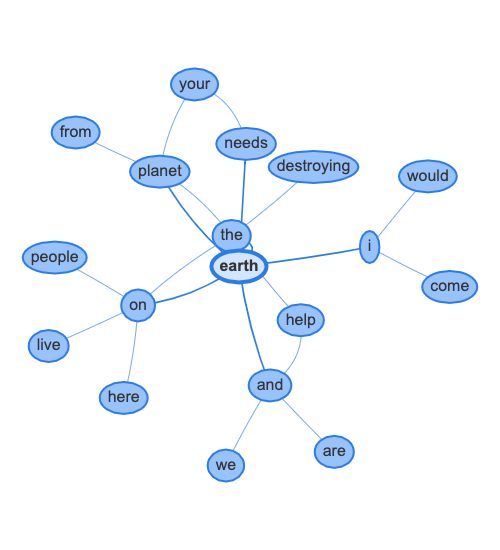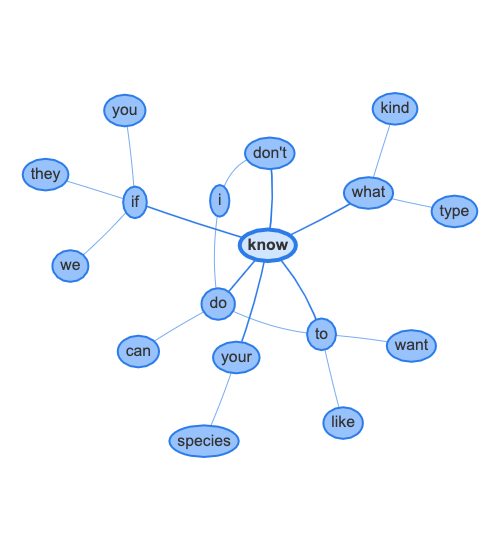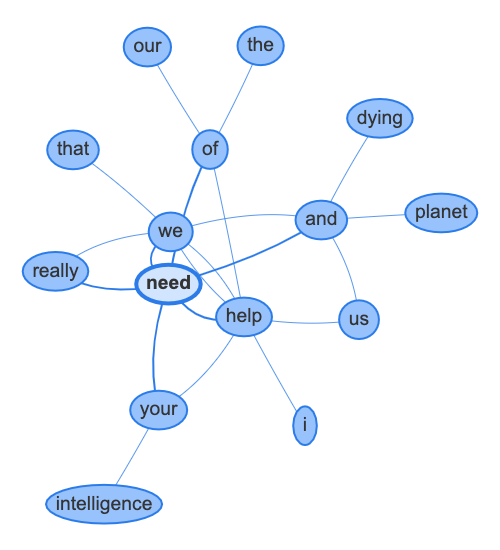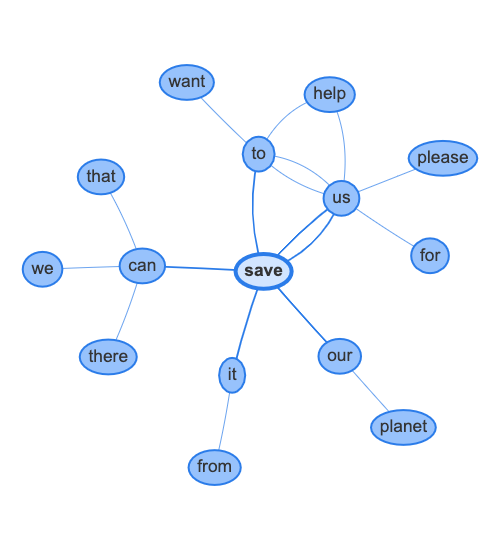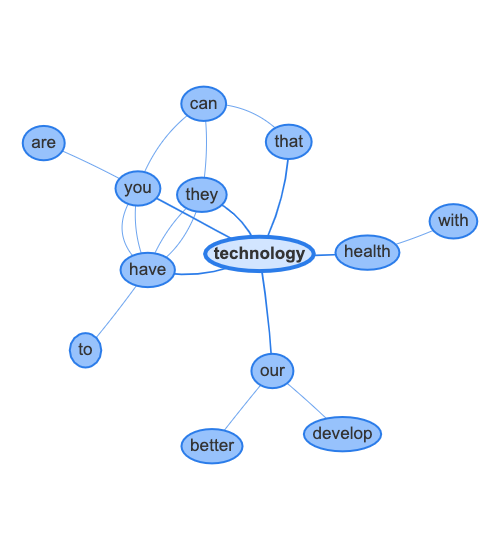Messages from the people of a dying planet.
On January 6th, 2020, we conducted a nationwide online survey of Mechanical Turk workers located in the United States1. Our primary question asked what message they would like to send to another star system.
Our report.
This report presents the worldview derived from our findings, including: the foremost model statements, panorama, mood, viewpoints, a brief elaboration on the model statement "please help us," and this study's horizon. These findings are the result of a quantitative phenomenology performed in January, 2020, by the Raven's Eye team using our online natural language analysis software2. Examples of the worldviews on other topics may be found here.
Our attitude.
This survey analysis results from a quantitative phenomenology utilizing Raven's Eye. Our attitude is one that seeks to:
• reliably and validly understand people's thoughts according to both phenomenological and scientific processes, and
• create synthetic model statements that reproduce both the most popular themes in those thoughts, and the ways that participants express them.
What results are themes expressed as model statements, which express the main thoughts of the participants as they themselves order and structure them. We seek when possible to produce themes that may be generalized with confidence to various groups and populations. This is the case for this survey with respect to Mechanical Turk workers in the United States at the time it was conducted.
Our survey.
In an online survey, we asked participants acquired through Amazon's Mechanical Turk their age, gender and state of residence, and then asked them to respond to the following item over the course of 2-3 sentences:
In your own words, please tell us what message you would like to send to another star system in the hope that an extraterrestrial intelligence will receive it.
We then asked participants to rate on a scale of 1-7 their comfort with sending a message to another star system, in the hope that it will be received by an extraterrestrial intelligence.
The main concepts utilized in our model statements were found at rates in excess of 20 times their typical use, and as such provide a measure of confidence in their association with the question posed3, 4. All such words in the model statements are emphasized in bold font, while the concepts around which the statements are created are also in blue text.
The worldview.

In your own words, please tell us what message you would like to send to another star system in the hope that an extraterrestrial intelligence will receive it.
Foremost model statements.
We are from the planet Earth.
Please help us.
I would like to know: what is life like on your planet?
How long have you been there?
Hello!
We come in peace.
The panorama.
Revealing the worldview's panorama involves understanding the general content and form of the natural language data acquired in response to our free response item. To do this, we first identify the gists, or individual word forms that are relatively overrepresented in them3. We then consider the overall style of the response set through measures of its vocabulary and verbosity. These gists and this style information then give us a sense of the whole—or as we call it, the panorama—presented by the worldview.
In your own words, please tell us what message you would like to send to another star system in the hope that an extraterrestrial intelligence will receive it.
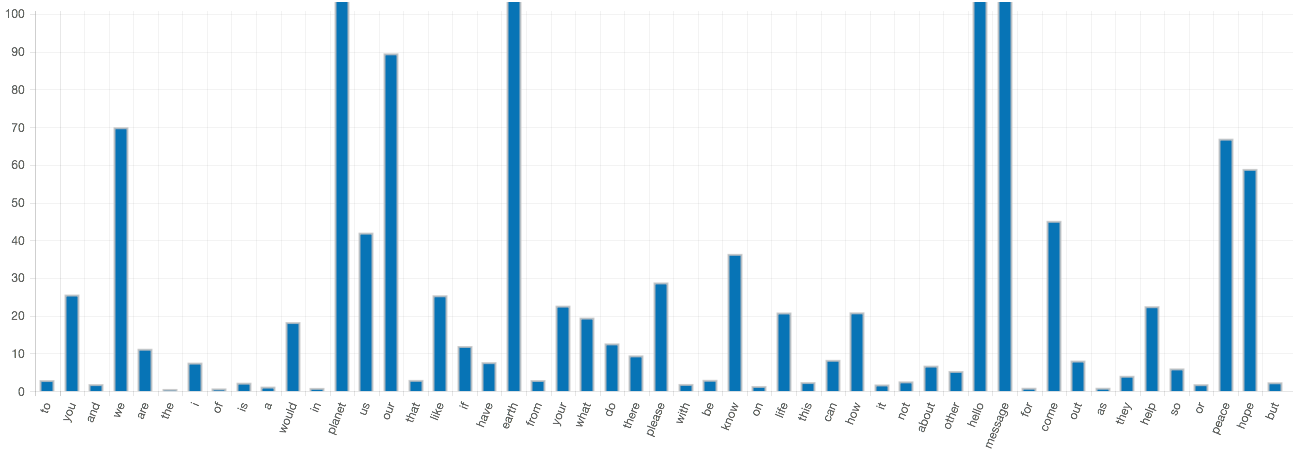
Figure 1. The fifty most frequent words in response to the item: In your own words, please tell us what message you would like to send to another star system in the hope that an extraterrestrial intelligence will receive it. The vertical axis represents the number of times that a word is found to be relatively overrepresented in the response set.
As visualized in Figure 1, in addition to words related to the question (such as like, message, and hope), concepts such as planet, Earth, please, know, life, how, hello, come, help, and peace are central to the messages of our respondents. The readability and grade-level scores indicate a simple sentence structure and low-average vocabulary, while the average response consists of 31 words over 2-3 sentences. Table 1 displays these measures of verbosity and vocabulary.
Measure
Score
Flesch Readability
78.92
Flesch-Kincaid Grade Level
5.06
Average Cell Word Count
31.35
Table 1. Measures of vocabulary and verbosity for responses to the item: In your own words, please tell us what message you would like to send to another star system in the hope that an extraterrestrial intelligence will receive it.
The mood.
The foremost ranked few words of any dataset utilizing quantitative phenomenology reveal the general mood of that dataset. A mood comprises the general way in which a topic or event is approached or considered, i.e., whether it is self-reflective, object-oriented, or other-oriented. The primary aspect of mood in this dataset is prepositional, as revealed by the word, "to." This preposition indicates a direction toward or approaching something, something of concern or being affected, or two things attached, in a relationship, or being compared. The secondary aspect of mood in this dataset is other-oriented, as revealed by the words "you" and "your." That is, the language in the dataset is secondarily about another being or beings, in terms of its selfhood and possessions. The tertiary aspect of mood is self-reflective, by way of group-identity through the use of the collective "we," "us," and "our" (and somewhat more weakly through the use of the individually self-referent "I"). Thus a substantial amount of the language in the dataset will also pertain to the writer's collective self-identification and possessions (and somewhat less predominately, the writer's individual self-identification).
From these three aspects of the mood, most content is expected to be primarily about things related to either "you," and "your," or "we," "us," and "our," or both. When combined with the relatively low (for adults) 5th-grade Flesch-Kincaid score, we conclude that response content is likely brief and informal communication between the self and another being, in which identification and possessions are of particular interest.
The viewpoints.
Worldviews are determined by the people, places, and times that co-create them. Therefore, in order to more fully understand the worldview on the messages people would like to send to an intelligent extraterrestrial lifeform in another star system presented in this survey, we highlight those aspects that contextualize and influence our findings. We call these contextualizing and influencing aspects viewpoints. We consider these viewpoints according to their origin in human factors (kuturgeist), spatial or environmental factors (ortgeist), or time-based factors (zeitgeist).
Kulturgeist
Our participants were recruited from Amazon Mechanical Turk, and were paid $0.15 for completing our 5-question survey. A total of 1,034 responses were received. After eliminating non-compliant responses5, 1,021 were deemed eligible for inclusion.
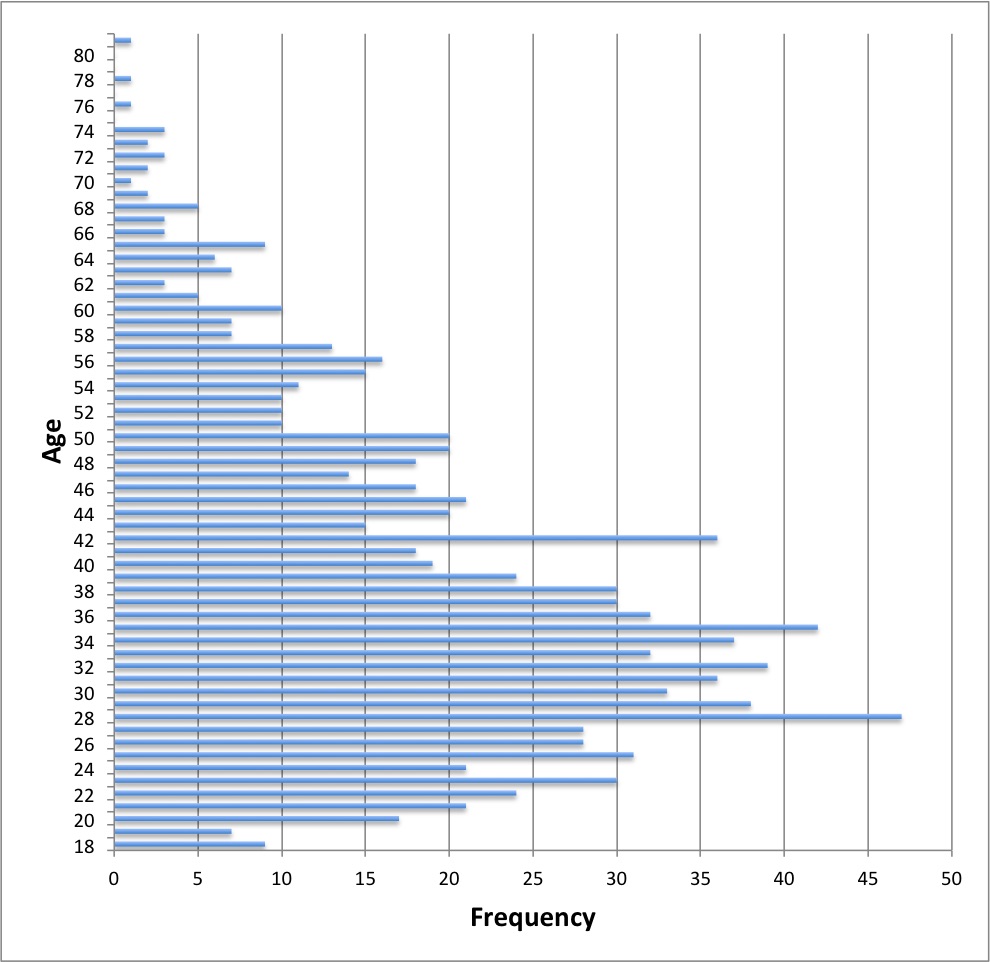
Figure 2. A frequency distribution of our participants' reported ages.
We asked participants, "how old are you?" As is depicted in Figure 2, the respondents included in our analysis were all adults, with an average age of 37.8 years old and a median age of 35 years old. This median age is about 3 years younger than the 2018 US Census median age of 38.1.
Comparing those below the median age to those above the median age did not result in modifications to the model statements reported herein, nor did these groups express substantial variation in the vocabulary or verbosity of responses (Flesch-Kincaid grade levels were with .5 grades of each other, and average cell word counts varied by approximately three words).
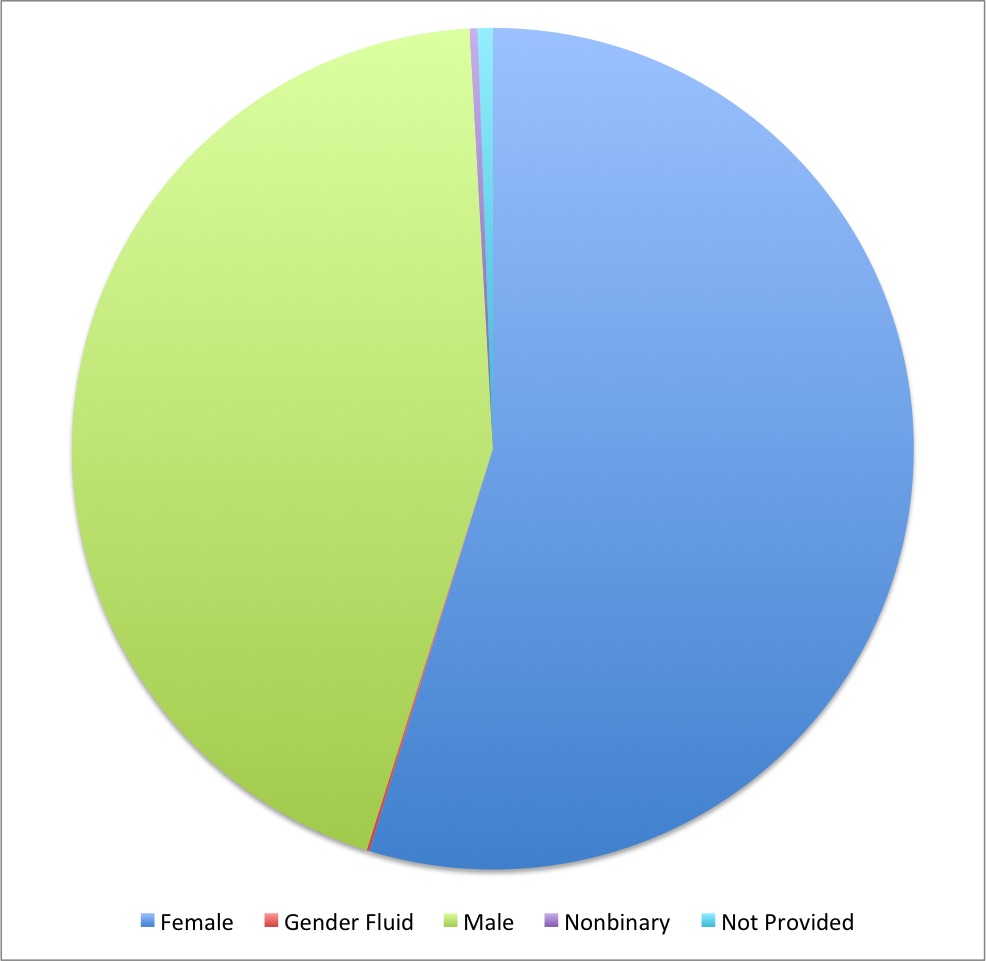
Figure 3. The proportion of responses received by reported gender/sex.
We asked participants, "what is your gender?" The majority of participants responded by stating their biological sex. We therefore utilized these terms as categorical labels, and grouped variants of "Female" and "Male" together. We grouped variant spellings of "Nonbinary," but did not include in this category the single participant who wrote, "gender fluid." As depicted in Figure 3, Females were more greatly represented than Males. Further comparison with US Census data indicates that these rates vary significantly from expected proportions in the US population (p<.01). Nonbinary individuals expressed a rate that is generally within the range of most recent US population estimates. Six participants did not respond to this question.
Gender did not affect the top model statements noted in this report. However, Females provided relatively less complex responses compared to Males (Flesch-Kincaid grade levels were 4.64 and 5.56, respectively). Verbosity did not appear to be affected by gender.
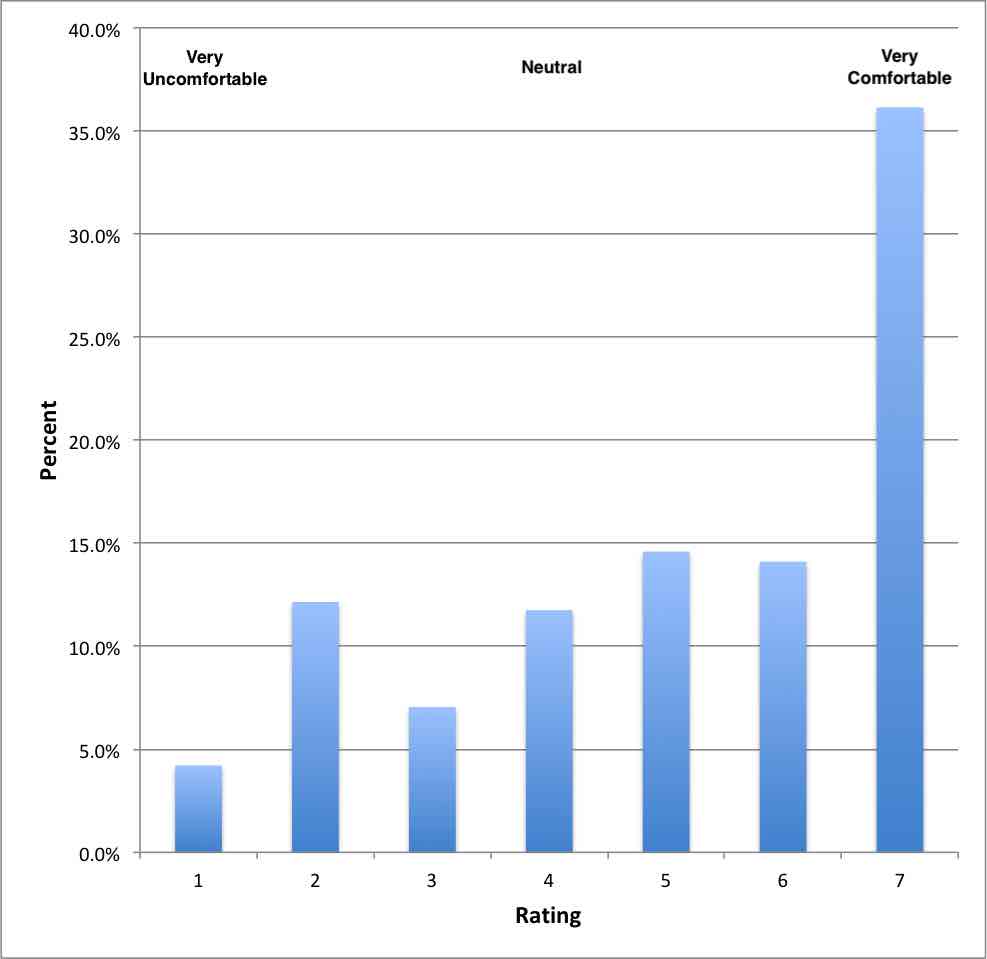
Figure 4. Proportional distribution of participant level of comfort with sending messages to another star system.
We asked participants, "on a scale of 1-7 (with 1 being "very uncomfortable" and 7 being "very comfortable"), how comfortable are you about sending messages to another star system in the hope that an extraterrestrial intelligence will receive them? The mean response on this item was just above the neutral point at 5.07, while the median was 6 and the modal response was 7, indicating a non-normal distribution of responses that tended toward being comfortable with sending messages. Indeed, 64.8% of participants indicated that they were at least somewhat comfortable with sending messages to another star system (based on the selection of ratings ranging from 5-7). Figure 4 depicts the percentage of respondents selecting each point along the 7-point scale.
Though the top model statements did not vary according to participants' level of comfort with sending a message, comfort did seem at least somewhat related to vocabulary and verbosity. Those indicating that they were uncomfortable with sending a message (selecting 1-3 on the 7-point scale) supplied relatively less complex and shorter responses, while those indicating that they were comfortable with sending a message (selecting 5-7 on the 7-point scale) supplied relatively more complex and longer messages. Flesch-Kincaid grade levels and average cell word counts for uncomfortable respondents were 4.72 and 27. 41 respectively, while Flesch-Kincaid grade levels and average cell word counts for comfortable respondents were 5.39 and 33.02 respectively.
Ortgeist
We asked participants, "In what state do you live?" The participants who took part in our study did so online through Amazon's Mechanical Turk. We limited our solicitation to those who were located in the United States of America, and as noted in bold above, requested that participants select the State in which they reside. We grouped States according to US Census Regions, and compared this to 2018 US Census population estimates. Doing so indicates that our sample can be considered as being regionally representative (within +1.8 % to -1.6% of US Census population estimates per region). Figure 5 displays the number of participants reporting residence in each US State.
The regional residence of participants did not appear to substantially influence the content of the model statements in this report, nor did it meaningfully affect the vocabulary or verbosity of the responses.
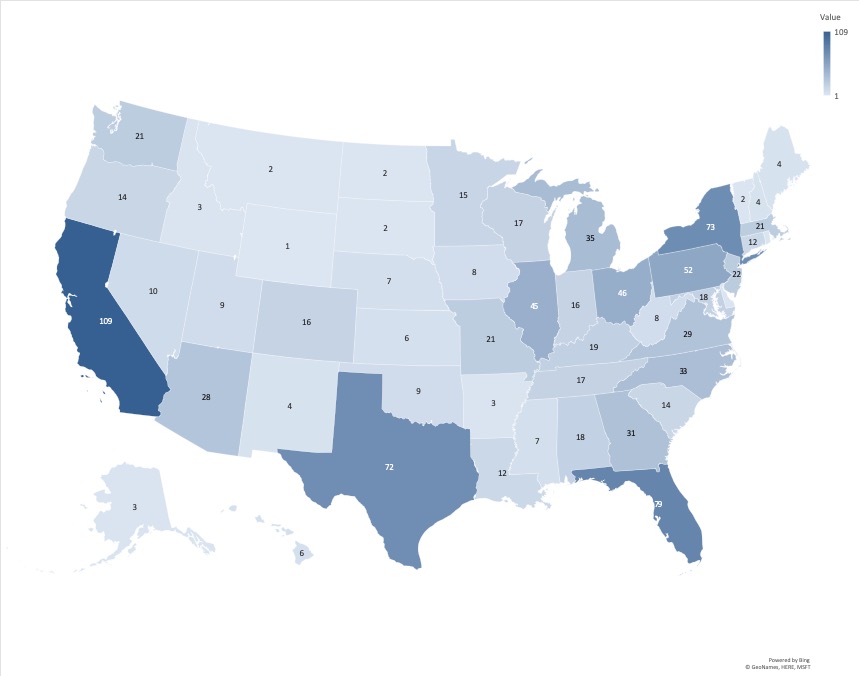
Figure 5. The geographic distribution of responses, according to the number of participants reporting residence in each US State.
Zeitgeist
This survey began on January 6th, 2020 at 1:54 p.m., PST and was continuously available until its conclusion the same evening at 8:49 p.m PST. Mechanical Turk automatically records and reports the time at which each response is submitted. Figure 6 reveals the distribution of completed surveys during the 7-hour period that the survey was available.
As with geography, the time of submission did not appear to influence the content or order of the model statements presented in this report, nor did it affect the vocabulary or verbosity of the responses.
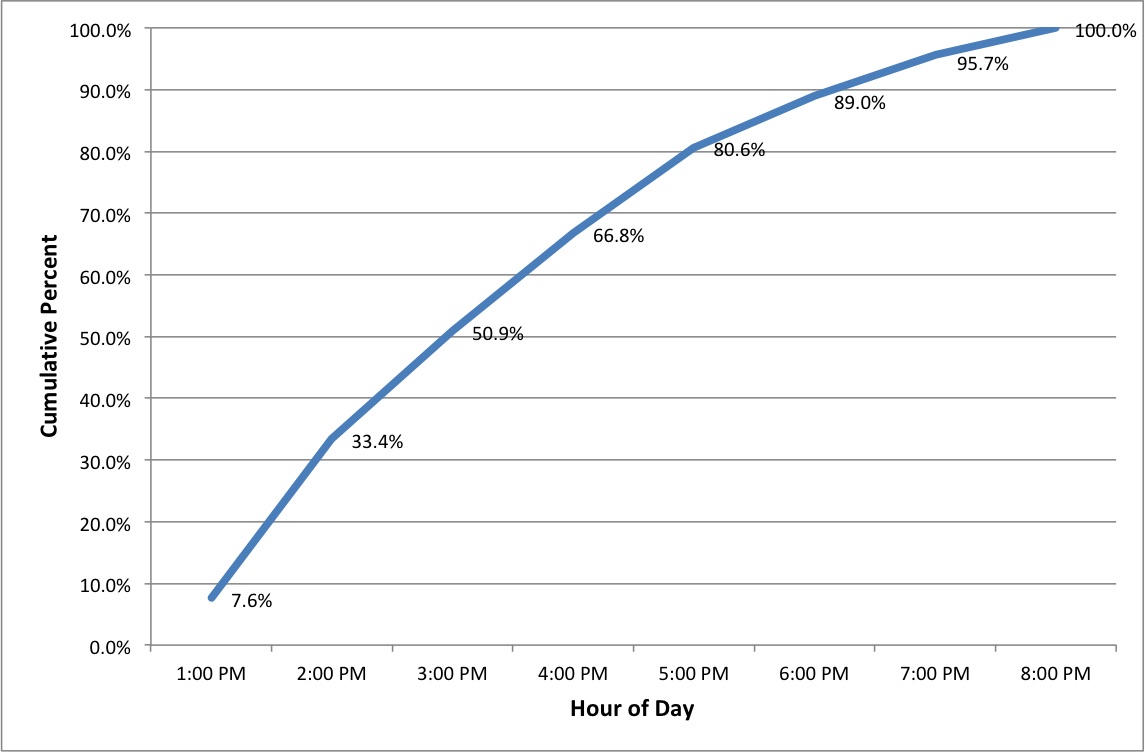
Figure 6. The cumulative percentage of responses received according to the hour of day.
The parts.
The parts of a worldview consist of the major units of meaning in the responses. We asked our participants to respond in their own words to one open-ended question. We treat the answers to this question as one complete unit of meaning when deriving our themes and model statements for this worldview. Thus, this worldview about what messages people would like to send to a potential extraterrestrial intelligence elsewhere in the universe consists of one major part: the complete answer to the single open-ended question soliciting their messages.
The theme structure.
Themes are structured from word networks, which center on the most frequent and overrepresented non-mood related (e.g., you, I, we, us, our) and stimulus associated (e.g., like, message, hope) concepts. These networks are based on the frequency of actual association between words in the original dataset. They graphically display the most frequent ordered relations between concepts as they are expressed in the language of our participants. Figures 7, 8, and 9 present three such word networks for the most frequent overrepresented concepts (planet, Earth, and please) used by respondents when asked what message they would like to send to an extraterrestrial intelligence in another star system.
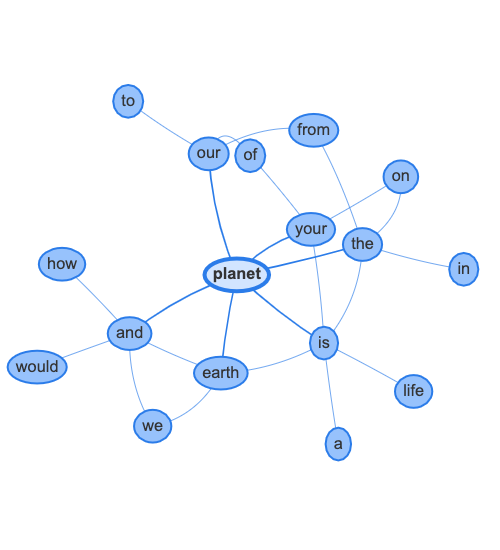
Figure 7. The word network for planet.
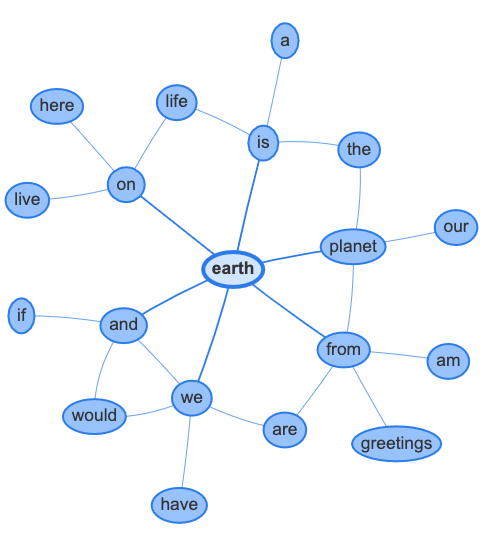
Figure 8. The word network for Earth.
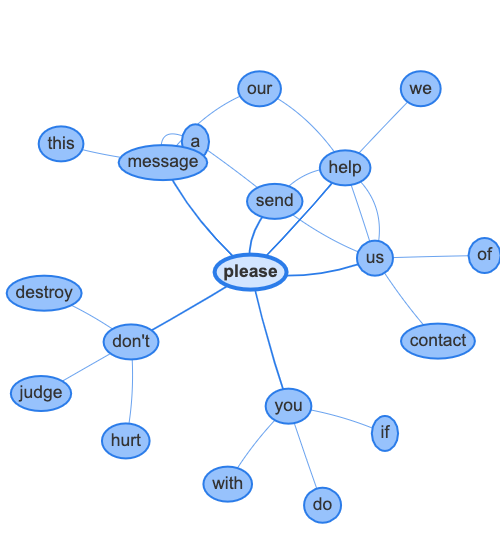
Figure 9. The word network for please.
As may be apparent from inspection of the networks presented in Figures 7 & 8, the concepts planet and Earth were very closely related, with the word Earth directly following the word planet in 95 out of 448 instances. The word planet was directly preceded by the word our in 121 instances, further bolstering the association between planet and it's English name: Earth. Planet is also, however, utilized as the assumed home of the extraterrestrial intelligence to whom the messages are directed, being preceded by the word your in 61 instances. These associations are apparent in our first and third model statements.
The concept please occurred 263 times in our dataset. A variety of words directly preceded please, the most frequent of which (you) accounted for 6.8% of the 263 times that the word please occurred, while message and us follow in ranked order thereafter. A somewhat similarly diverse set of words directly follow the word please, with help constituting 10.6% of these, followed by don't and respond. As may be apparent in the word network presented in Figure 9, examining the two words preceding and following the word please results in greater clarity that combined forms of please help (or save) us (or our) and help us please form the most frequent model statements surrounding the word please, while forms of please don't judge (or destroy, or hurt) are secondary. The third-ranked concept directly following the word please is send, which is both about sending a message, as in please send us (a message), and another variant of asking for help, as in please send help. The second model statement created for this worldview therefore reflects the plea for help formed by the use of the word please in its most frequent and direct form.
Elaboration on please help us.
Each model statement produced in our analysis can be elaborated to extend the concepts contained within them, as well as to identify permutations in central themes. Here, we elaborate on the model statement, please help us, in order to more fully understand the issues people are asking for help. We do so by examining the extended word network surrounding help, and by reducing our meaning unit from the complete response to only those sentences that contain the word help.
Expanding the network surrounding help.
The unexpanded network.
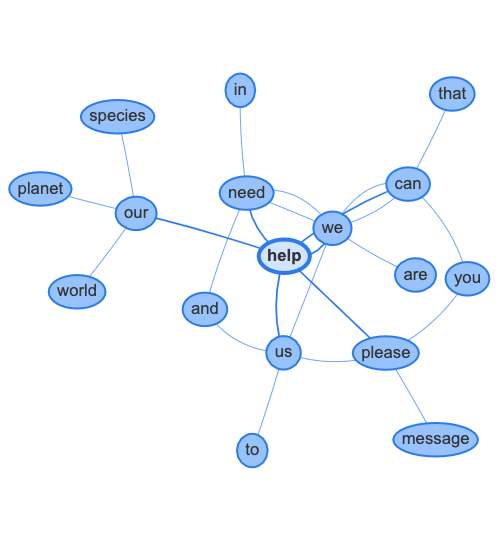
Figure 10. The un-expanded word network surrounding help.
The expanded network.
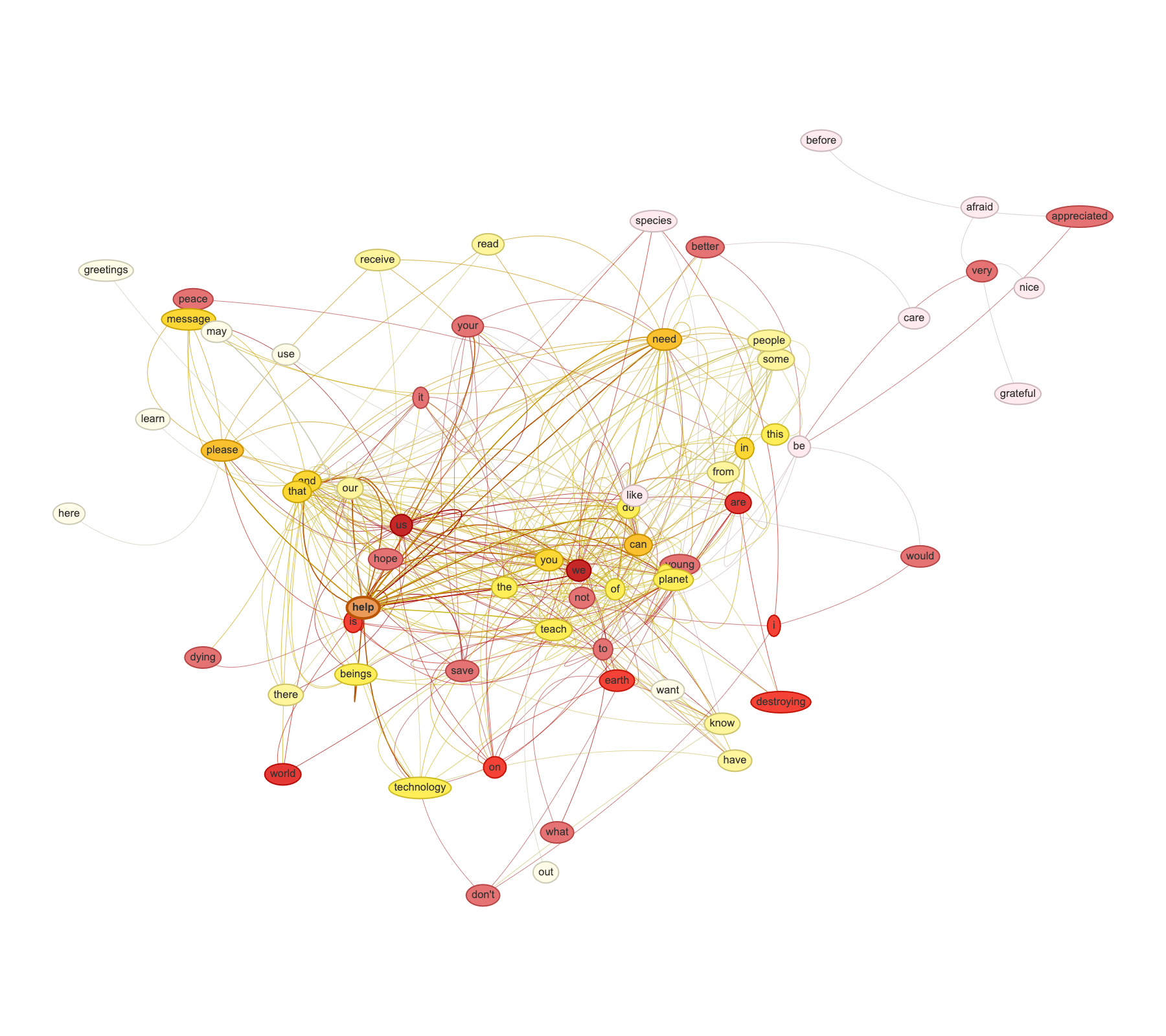
Figure 11. The expanded word network surrounding the word help.
In the unexpanded word network depicted in Figure 10, the words planet, species, and world are identifiable, as is the word need, among others. These associations provide indicators of the issues for which help is being requested, but remain somewhat non-specific.
In the expanded word network presented in Figure 11, more elaboration becomes visible. In this figure, the target word help is depicted in orange, while the words following it are depicted in lighter shades of red for each word-level away from help they are located. Similarly, the words preceding the word help are depicted in lighter shades of yellow as they are found at an increasing number of words away from the target word.
Comparing Figures 10 and 11, additionally associated words become apparent, such as destroying, dying, learn, teach, and technology (among others).
Reducing the meaning unit to only those sentences including help.
Reduction of the meaning unit.
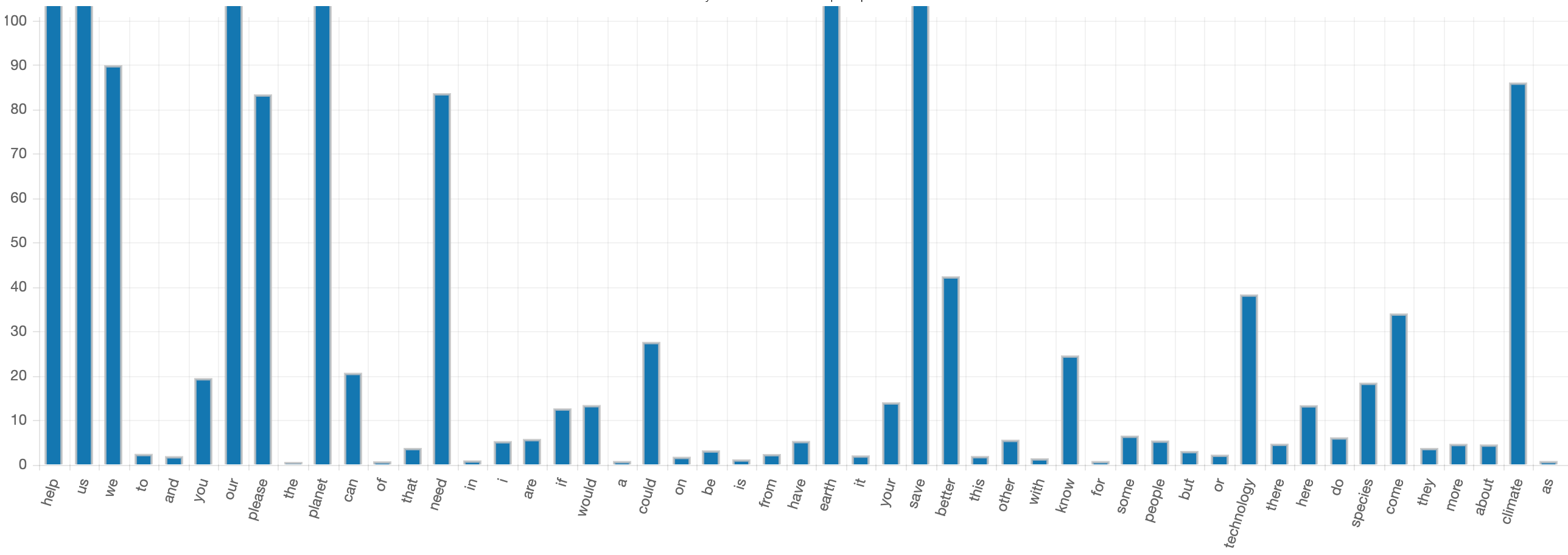
Figure 12. The most frequent words from sentences including the word help.
Figure 12 depicts the topmost frequent words found in sentences including the word help. By reducing the meaning unit in this way, the elaborations on please help us become more apparent, and readily explorable. Because the model statement is derived from the actual words used by participants, and this sentence-based meaning unit is a subset of the original unit of meaning as defined by each participant's entire response, the words please help, and the mood-related words us, we, to, you, and our are also frequent and similarly overrepresented in Figure 12. Likewise, in this chart the words planet, Earth, and know are also again overrepresented. However, additional words, including need, could, save, better, technology, come, and climate, also become apparent. Figures 13 to 21 depict several of these word networks.
-
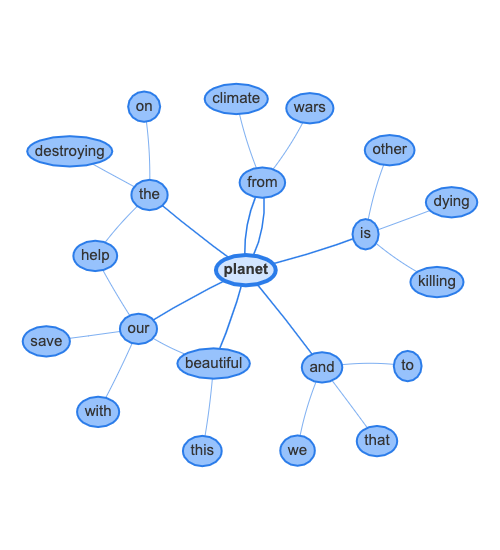
Figure 13. The word network for planet in sentences containing help.
-
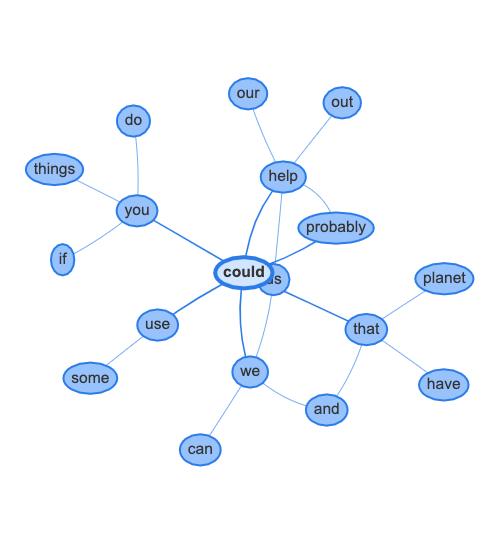
Figure 16. The word network for could in sentences containing help.
-
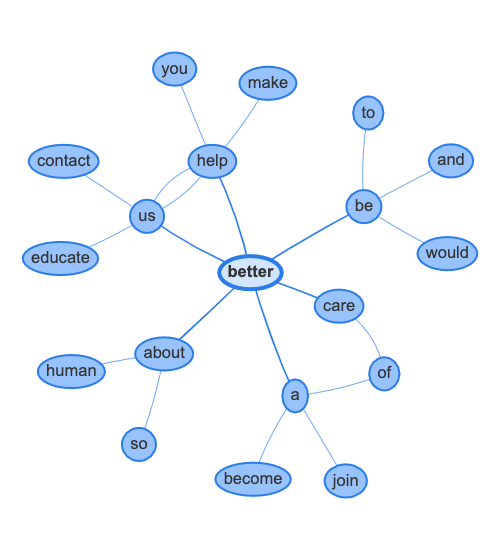
Figure 19. The word network for better in sentences containing help.
-
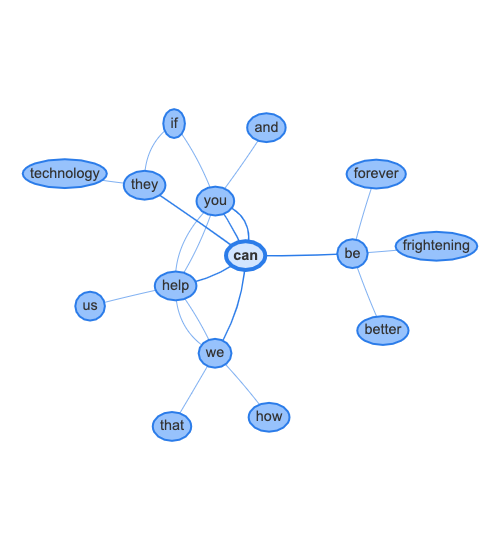
Figure 14. The word network for can in sentences containing help.
-
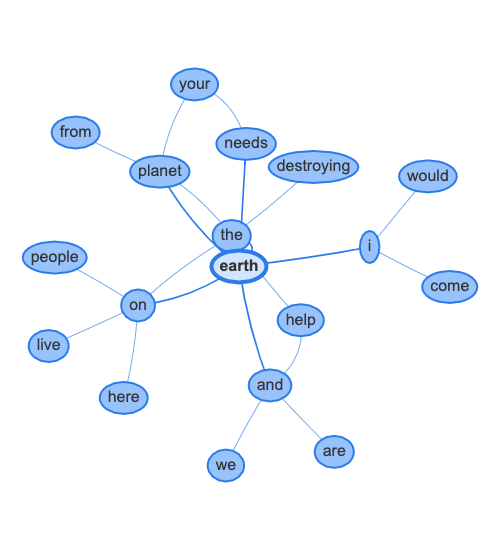
Figure 17. The word network for Earth in sentences containing help.
-
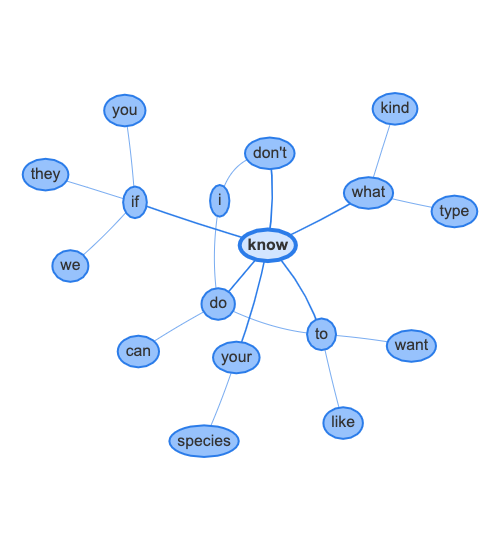
Figure 20. The word network for know in sentences containing help.
-
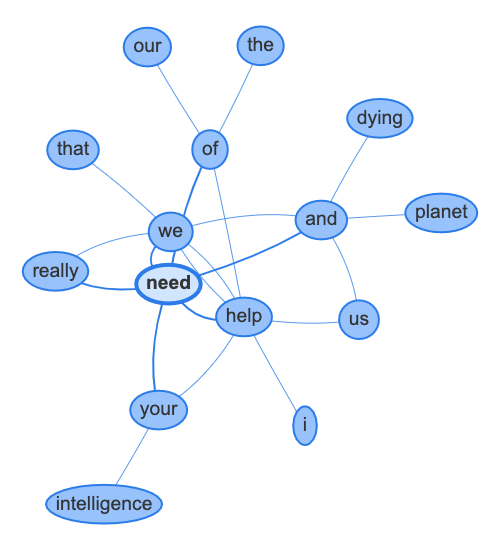
Figure 15. The word network for need in sentences containing help.
-
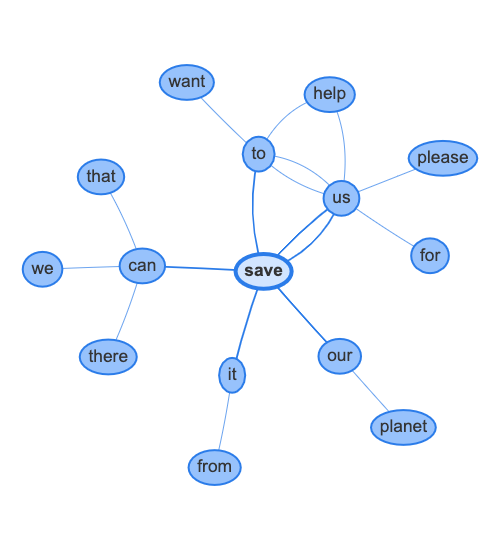
Figure 18. The word network for save in sentences containing help.
-
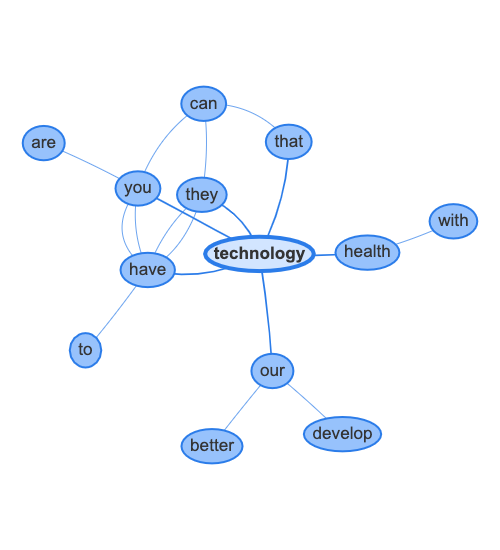
Figure 21. The word network for technology in sentences containing help.
Other, overrepresented words not appearing in the topmost words included: send, things, ourselves, understand, don't, killing, ask, maybe, universe, soon, dying, dark, advanced, beings, and environment, among others. Though less frequent, these words often further elaborate on the words presented in Figures 12 to 21.
Given the word networks and associations present in meaning units comprised of sentences containing the word help, the following model statements can be created to elaborate on please help us.
Please help us
…our planet is dying.
…we need your intelligence.
…we could use help fixing our planet.
…we are destroying the Earth.
…save our planet from climate change.
…better ourselves and our technology.
Other less frequent elaborations also exist, of course, such as we are killing our planet and each other. By elaborating on help through reduction of the meaning unit to sentences containing that word, we find that such help is generally requested to combat human-made climate change and environmental destruction, and to better ourselves and our planet. When combining this with the associations noted in the discussion on Figures 10 and 11, the expectation appears that such help will come through being educated or taught from a more advanced and intelligent species, and from learning about their relatively more advanced technology.
The interpretation.
Given the foremost model statements, panorama, and mood of the natural language analyzed in this survey, we find its contents to be informal communication between the collective self and another being. That communication primarily involves an introduction with reference to our planet, followed by a plea for help and questions about knowing how the other being lives and experiences life on its world (with subsequent questions about that being's knowledge in general, as well as how to solve practical problems of existence). This is then followed by a greeting, and an indication that we mean no harm to the extraterrestrial intelligence.
The foremost model statements do not vary in their content across the people, places, and time involved in our survey, though some differences in complexity are apparent between genders. Most participants are comfortable with sending a message. While the content of the model statements does not appear to vary based on this comfort level, the length and vocabulary of the messages created by our participants does. Those who are uncomfortable with sending a message produce shorter and less complex messages, possibly as a result of their reticence.
Elaborating on the model statement, please help us, reveals that such help is primarily requested to resolve climate and environmental difficulties, for which our respondents feel that we are responsible. A secondary set of requests involves improving our knowledge and technology as a species, both in general and to again address planetary problems. The final theme arising in requests for help involves reducing human violence directed at other humans.
The horizon.
Our results are bounded by the people, places, and time in which they were produced. For example, our participants were drawn from Amazon Mechanical Turk workers located in the United States. As such, they may have certain characteristics or experiences that vary from that expressed by the typical person in this nation. These characteristics or experiences may, in turn, systematically relate to variation in thoughts about a given topic.
To counter potential limitations, we have utilized a high threshold for creating a model statement around a concept in our report. In order for a model statement to be created around a given concept, that concept must have been expressed at a rate that exceeded 20 times its typical rate of use in everyday English3. By our estimates, our sample likely includes approximately 55% of the total population of Mechanical Turk workers available in the United States during the time that the survey was available4.
The cut-off threshold of 20 that we used for our analysis makes it such that our confidence estimate for our results exceeds the total possible population of available Mechanical Turk workers in the United States at any given time. We are, therefore, quite confident that our results can be generally applied to this population, at least at this point in history4.
However, as an indication that the horizon of our results might in actuality extend beyond the current population, we encourage interested readers to inspect the results of publications by Vakoch et. al (2013), and Lower et al. (2011)6. Both of these publications report on the results from an international online survey conducted in 2009-2010, which asked participants what they would want to say to an extraterrestrial intelligence.
Vakoch et. al (2013, p. 137) lists and validates the top themes in the multinational sample, which greatly correspond to the model statements reported in this worldview. For comparison, the five most frequent themes found were, verbatim:
- We are humans of the planet Earth.
- You are alien to us, but you have know how.
- Hello and welcome.
- Please help.
- Peace, love, and friendship.
When the results of these previous publications are compared to this current worldview, a substantial amount of concurrence in the top themes and model statements becomes readily apparent. We conclude, therefore, that our worldview's model statements may indeed extend well beyond the horizon formed by the demographic, geographic, and temporal conditions of this current survey. It would appear that if given the opportunity, everyday people would call out to the stars for help to solve their environmental and social difficulties, and have been wanting to do so for at least the last decade.
The worldview.

In your own words, please tell us what message you would like to send to another star system in the hope that an extraterrestrial intelligence will receive it.
Foremost model statements.
We are from the planet Earth.
Please help us.
I would like to know: what is life like on your planet?
How long have you been there?
Hello!
We come in peace.
The panorama.
Revealing the worldview's panorama involves understanding the general content and form of the natural language data acquired in response to our free response item. To do this, we first identify the gists, or individual word forms that are relatively overrepresented in them3. We then consider the overall style of the response set through measures of its vocabulary and verbosity. These gists and this style information then give us a sense of the whole—or as we call it, the panorama—presented by the worldview.
In your own words, please tell us what message you would like to send to another star system in the hope that an extraterrestrial intelligence will receive it.
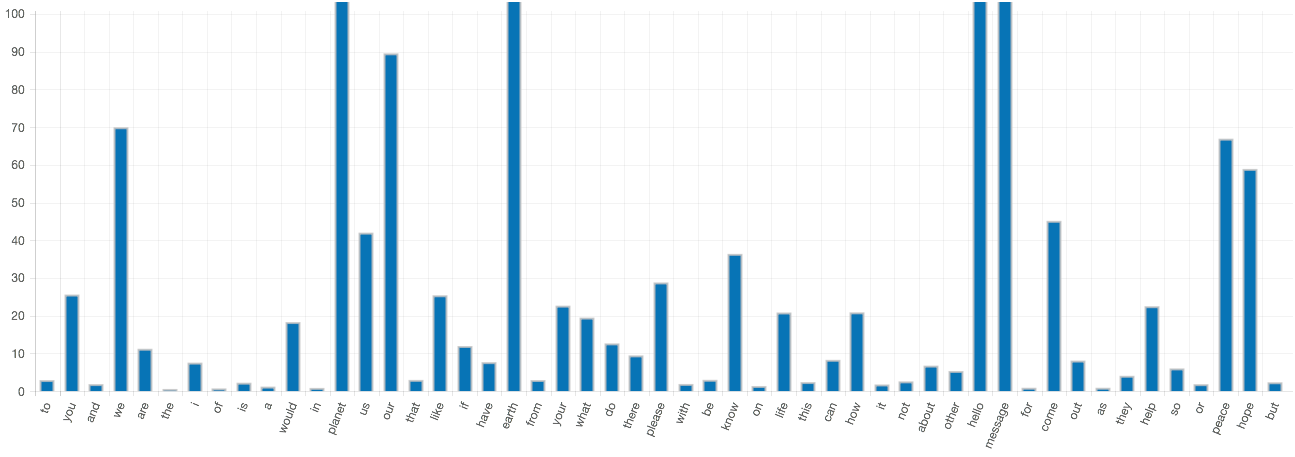
Figure 1. The fifty most frequent words in response to the item: In your own words, please tell us what message you would like to send to another star system in the hope that an extraterrestrial intelligence will receive it. The vertical axis represents the number of times that a word is found to be relatively overrepresented in the response set.
As visualized in Figure 1, in addition to words related to the question (such as like, message, and hope), concepts such as planet, Earth, please, know, life, how, hello, come, help, and peace are central to the messages of our respondents. The readability and grade-level scores indicate a simple sentence structure and low-average vocabulary, while the average response consists of 31 words over 2-3 sentences. Table 1 displays these measures of verbosity and vocabulary.
Measure
Score
Flesch Readability
78.92
Flesch-Kincaid Grade Level
5.06
Average Cell Word Count
31.35
Table 1. Measures of vocabulary and verbosity for responses to the item: In your own words, please tell us what message you would like to send to another star system in the hope that an extraterrestrial intelligence will receive it.
The mood.
The foremost ranked few words of any dataset utilizing quantitative phenomenology reveal the general mood of that dataset. A mood comprises the general way in which a topic or event is approached or considered, i.e., whether it is self-reflective, object-oriented, or other-oriented. The primary aspect of mood in this dataset is prepositional, as revealed by the word, "to." This preposition indicates a direction toward or approaching something, something of concern or being affected, or two things attached, in a relationship, or being compared. The secondary aspect of mood in this dataset is other-oriented, as revealed by the words "you" and "your." That is, the language in the dataset is secondarily about another being or beings, in terms of its selfhood and possessions. The tertiary aspect of mood is self-reflective, by way of group-identity through the use of the collective "we," "us," and "our" (and somewhat more weakly through the use of the individually self-referent "I"). Thus a substantial amount of the language in the dataset will also pertain to the writer's collective self-identification and possessions (and somewhat less predominately, the writer's individual self-identification).
From these three aspects of the mood, most content is expected to be primarily about things related to either "you," and "your," or "we," "us," and "our," or both. When combined with the relatively low (for adults) 5th-grade Flesch-Kincaid score, we conclude that response content is likely brief and informal communication between the self and another being, in which identification and possessions are of particular interest.
The viewpoints.
Worldviews are determined by the people, places, and times that co-create them. Therefore, in order to more fully understand the worldview on the messages people would like to send to an intelligent extraterrestrial lifeform in another star system presented in this survey, we highlight those aspects that contextualize and influence our findings. We call these contextualizing and influencing aspects viewpoints. We consider these viewpoints according to their origin in human factors (kuturgeist), spatial or environmental factors (ortgeist), or time-based factors (zeitgeist).
Kulturgeist
Our participants were recruited from Amazon Mechanical Turk, and were paid $0.15 for completing our 5-question survey. A total of 1,034 responses were received. After eliminating non-compliant responses5, 1,021 were deemed eligible for inclusion.
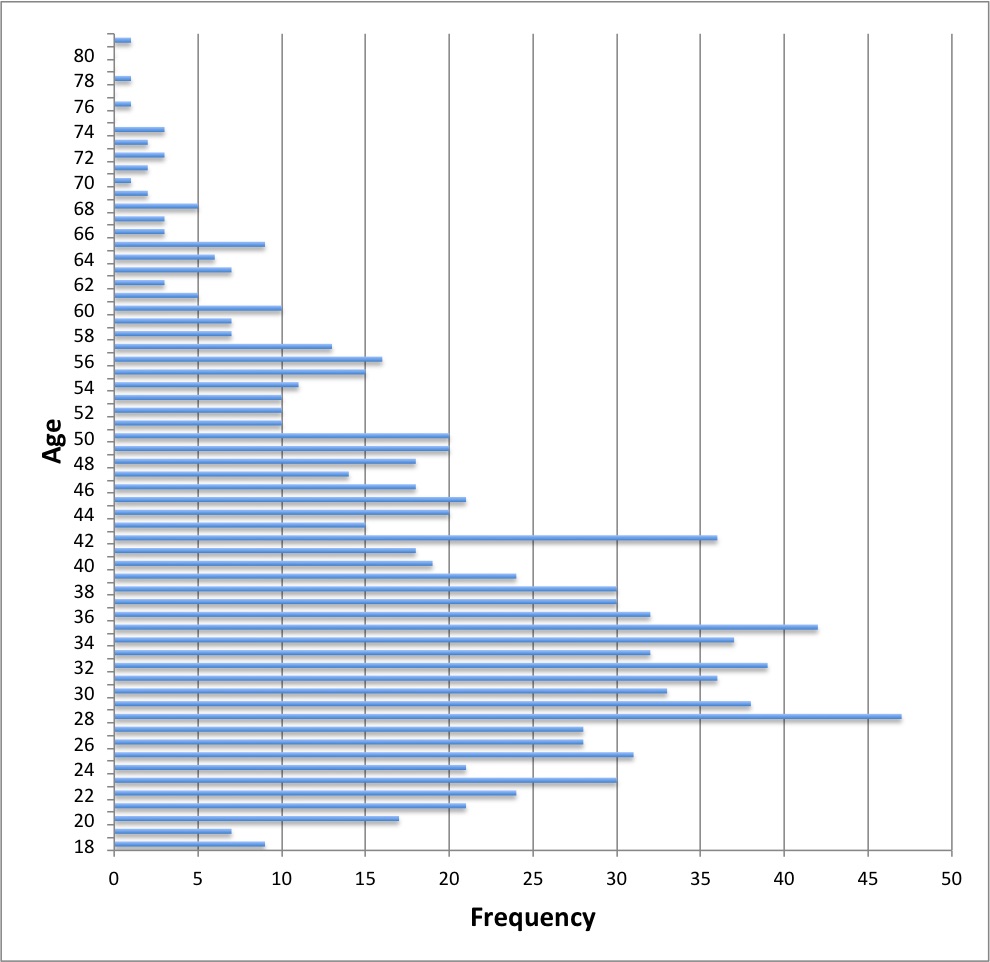
Figure 2. A frequency distribution of our participants' reported ages.
We asked participants, "how old are you?" As is depicted in Figure 2, the respondents included in our analysis were all adults, with an average age of 37.8 years old and a median age of 35 years old. This median age is about 3 years younger than the 2018 US Census median age of 38.1.
Comparing those below the median age to those above the median age did not result in modifications to the model statements reported herein, nor did these groups express substantial variation in the vocabulary or verbosity of responses (Flesch-Kincaid grade levels were with .5 grades of each other, and average cell word counts varied by approximately three words).
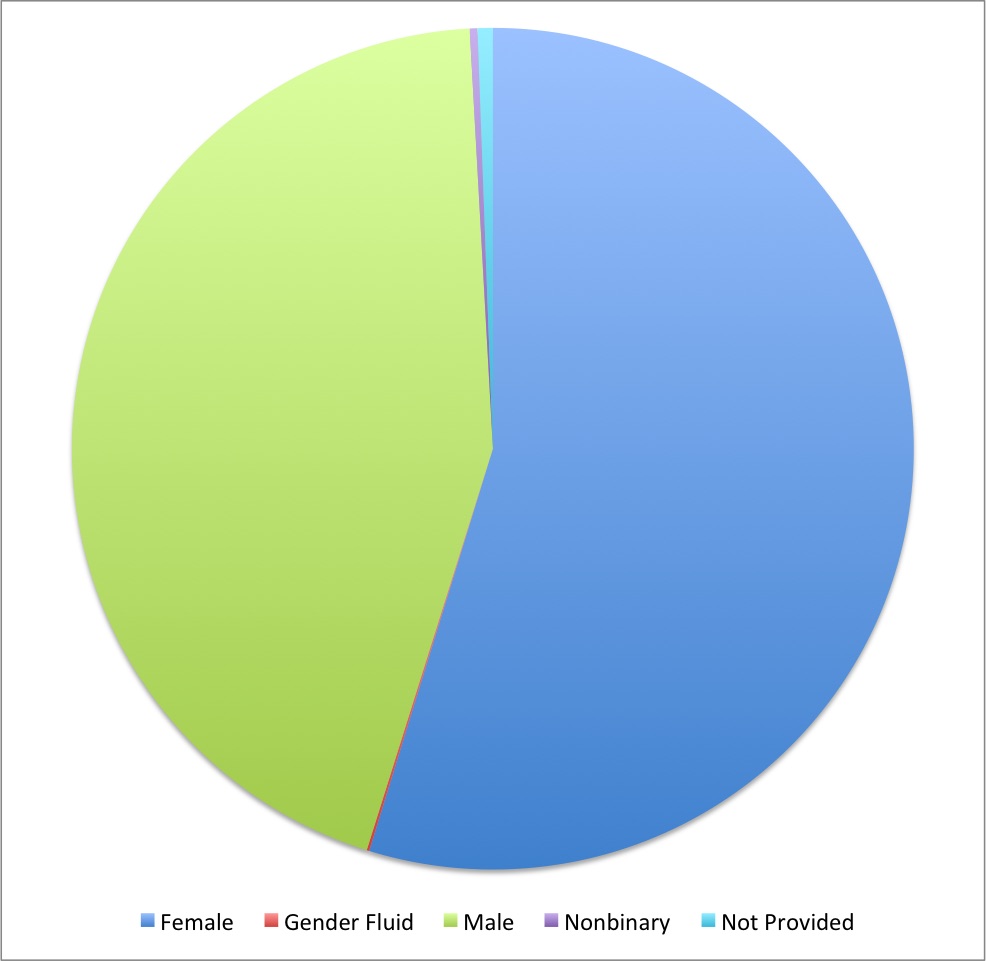
Figure 3. The proportion of responses received by reported gender/sex.
We asked participants, "what is your gender?" The majority of participants responded by stating their biological sex. We therefore utilized these terms as categorical labels, and grouped variants of "Female" and "Male" together. We grouped variant spellings of "Nonbinary," but did not include in this category the single participant who wrote, "gender fluid." As depicted in Figure 3, Females were more greatly represented than Males. Further comparison with US Census data indicates that these rates vary significantly from expected proportions in the US population (p<.01). Nonbinary individuals expressed a rate that is generally within the range of most recent US population estimates. Six participants did not respond to this question.
Gender did not affect the top model statements noted in this report. However, Females provided relatively less complex responses compared to Males (Flesch-Kincaid grade levels were 4.64 and 5.56, respectively). Verbosity did not appear to be affected by gender.
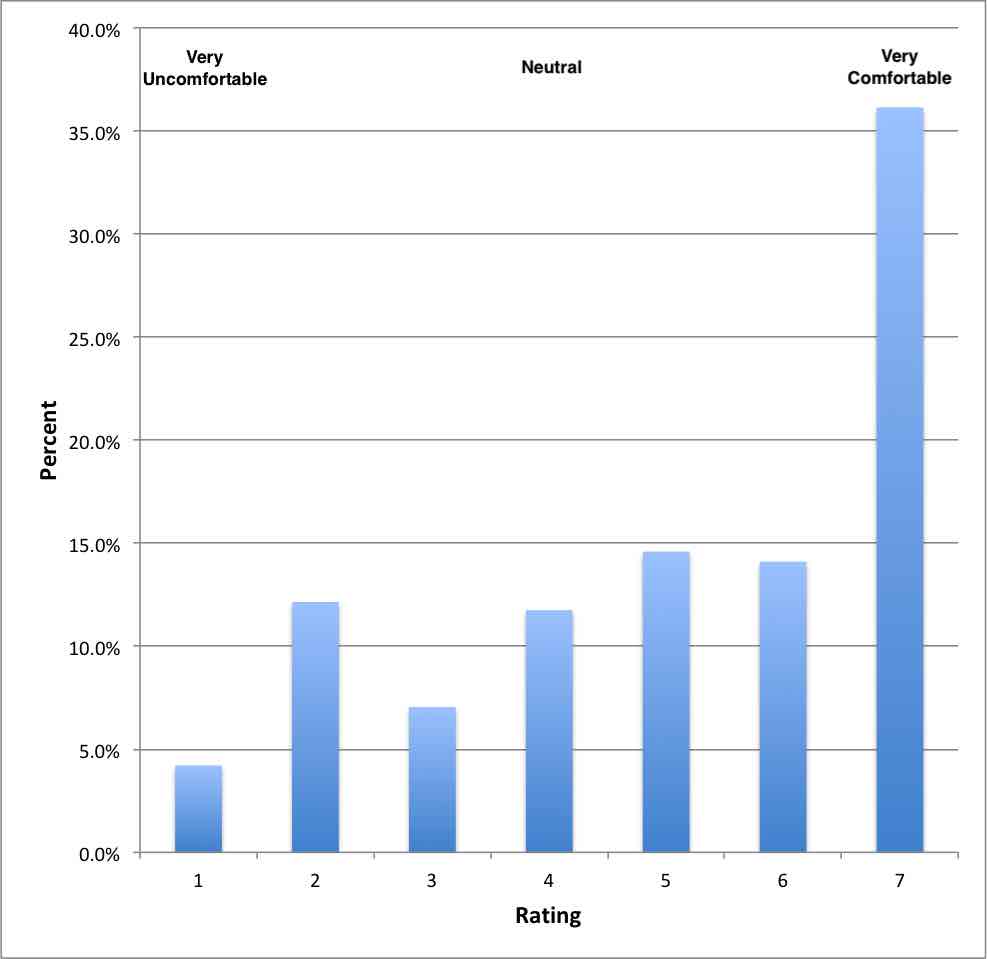
Figure 4. Proportional distribution of participant level of comfort with sending messages to another star system.
We asked participants, "on a scale of 1-7 (with 1 being "very uncomfortable" and 7 being "very comfortable"), how comfortable are you about sending messages to another star system in the hope that an extraterrestrial intelligence will receive them? The mean response on this item was just above the neutral point at 5.07, while the median was 6 and the modal response was 7, indicating a non-normal distribution of responses that tended toward being comfortable with sending messages. Indeed, 64.8% of participants indicated that they were at least somewhat comfortable with sending messages to another star system (based on the selection of ratings ranging from 5-7). Figure 4 depicts the percentage of respondents selecting each point along the 7-point scale.
Though the top model statements did not vary according to participants' level of comfort with sending a message, comfort did seem at least somewhat related to vocabulary and verbosity. Those indicating that they were uncomfortable with sending a message (selecting 1-3 on the 7-point scale) supplied relatively less complex and shorter responses, while those indicating that they were comfortable with sending a message (selecting 5-7 on the 7-point scale) supplied relatively more complex and longer messages. Flesch-Kincaid grade levels and average cell word counts for uncomfortable respondents were 4.72 and 27. 41 respectively, while Flesch-Kincaid grade levels and average cell word counts for comfortable respondents were 5.39 and 33.02 respectively.
Ortgeist
We asked participants, "In what state do you live?" The participants who took part in our study did so online through Amazon's Mechanical Turk. We limited our solicitation to those who were located in the United States of America, and as noted in bold above, requested that participants select the State in which they reside. We grouped States according to US Census Regions, and compared this to 2018 US Census population estimates. Doing so indicates that our sample can be considered as being regionally representative (within +1.8 % to -1.6% of US Census population estimates per region). Figure 5 displays the number of participants reporting residence in each US State.
The regional residence of participants did not appear to substantially influence the content of the model statements in this report, nor did it meaningfully affect the vocabulary or verbosity of the responses.
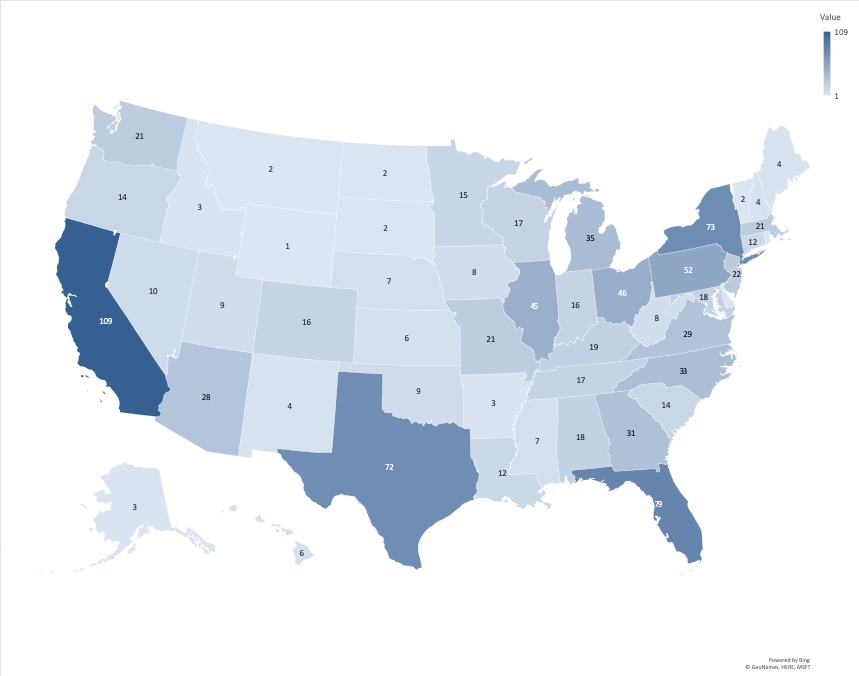
Figure 5. The geographic distribution of responses, according to the number of participants reporting residence in each US State.
Zeitgeist
This survey began on January 6th, 2020 at 1:54 p.m., PST and was continuously available until its conclusion the same evening at 8:49 p.m PST. Mechanical Turk automatically records and reports the time at which each response is submitted. Figure 6 reveals the distribution of completed surveys during the 7-hour period that the survey was available.
As with geography, the time of submission did not appear to influence the content or order of the model statements presented in this report, nor did it affect the vocabulary or verbosity of the responses.
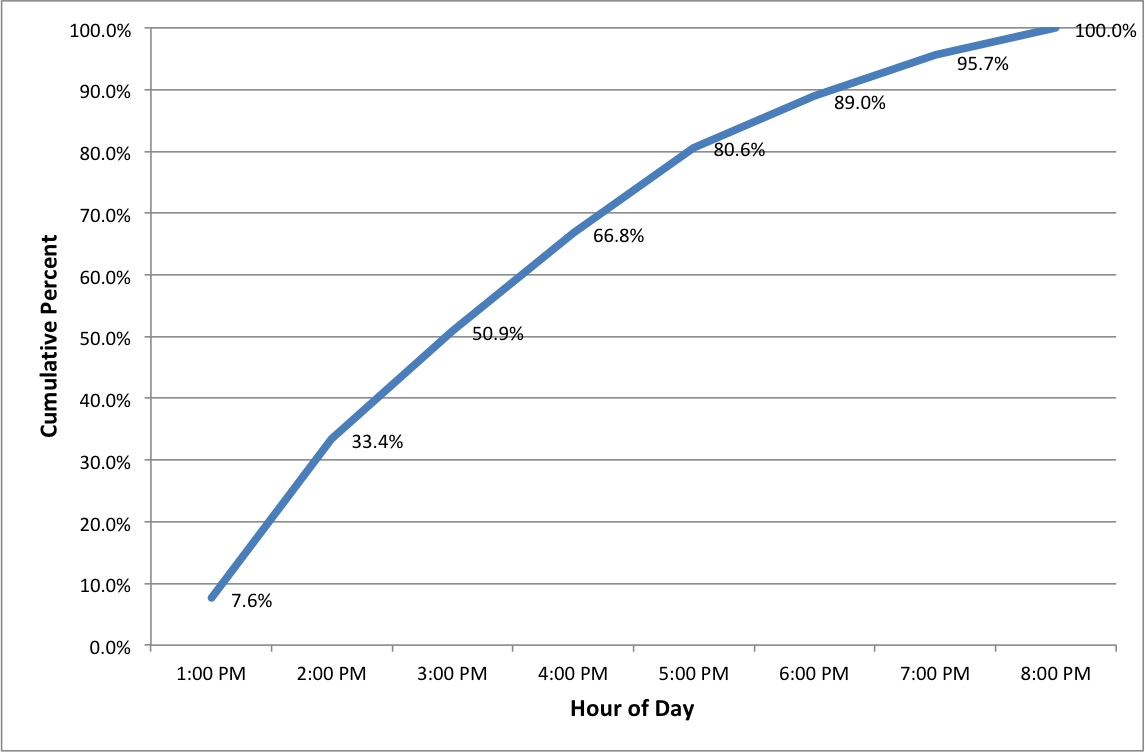
Figure 6. The cumulative percentage of responses received according to the hour of day.
The parts.
The parts of a worldview consist of the major units of meaning in the responses. We asked our participants to respond in their own words to one open-ended question. We treat the answers to this question as one complete unit of meaning when deriving our themes and model statements for this worldview. Thus, this worldview about what messages people would like to send to a potential extraterrestrial intelligence elsewhere in the universe consists of one major part: the complete answer to the single open-ended question soliciting their messages.
The theme structure.
Themes are structured from word networks, which center on the most frequent and overrepresented non-mood related (e.g., you, I, we, us, our) and stimulus associated (e.g., like, message, hope) concepts. These networks are based on the frequency of actual association between words in the original dataset. They graphically display the most frequent ordered relations between concepts as they are expressed in the language of our participants. Figures 7, 8, and 9 present three such word networks for the most frequent overrepresented concepts (planet, Earth, and please) used by respondents when asked what message they would like to send to an extraterrestrial intelligence in another star system.
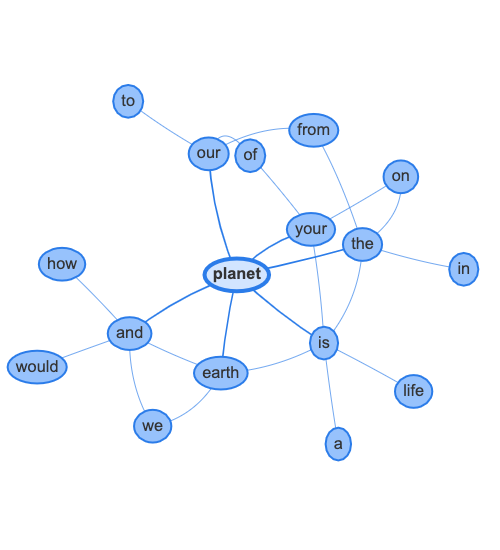
Figure 7. The word network for planet.
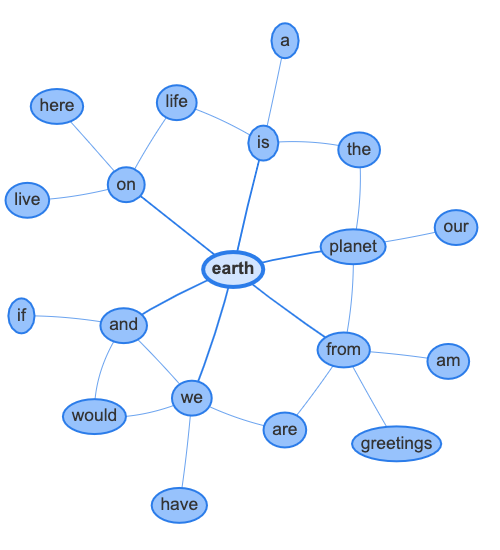
Figure 8. The word network for Earth.
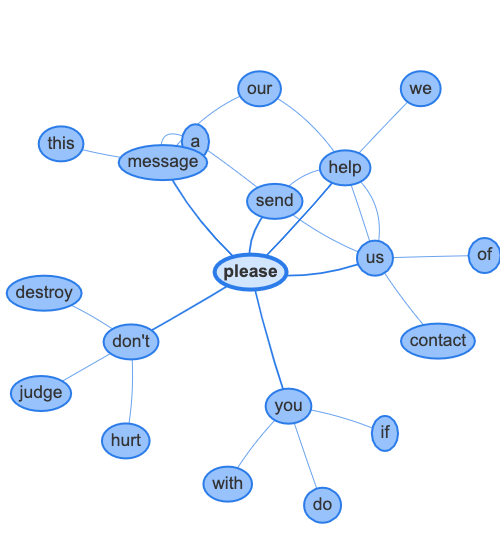
Figure 9. The word network for please.
As may be apparent from inspection of the networks presented in Figures 7 & 8, the concepts planet and Earth were very closely related, with the word Earth directly following the word planet in 95 out of 448 instances. The word planet was directly preceded by the word our in 121 instances, further bolstering the association between planet and it's English name: Earth. Planet is also, however, utilized as the assumed home of the extraterrestrial intelligence to whom the messages are directed, being preceded by the word your in 61 instances. These associations are apparent in our first and third model statements.
The concept please occurred 263 times in our dataset. A variety of words directly preceded please, the most frequent of which (you) accounted for 6.8% of the 263 times that the word please occurred, while message and us follow in ranked order thereafter. A somewhat similarly diverse set of words directly follow the word please, with help constituting 10.6% of these, followed by don't and respond. As may be apparent in the word network presented in Figure 9, examining the two words preceding and following the word please results in greater clarity that combined forms of please help (or save) us (or our) and help us please form the most frequent model statements surrounding the word please, while forms of please don't judge (or destroy, or hurt) are secondary. The third-ranked concept directly following the word please is send, which is both about sending a message, as in please send us (a message), and another variant of asking for help, as in please send help. The second model statement created for this worldview therefore reflects the plea for help formed by the use of the word please in its most frequent and direct form.
Elaboration on please help us.
Each model statement produced in our analysis can be elaborated to extend the concepts contained within them, as well as to identify permutations in central themes. Here, we elaborate on the model statement, please help us, in order to more fully understand the issues people are asking for help. We do so by examining the extended word network surrounding help, and by reducing our meaning unit from the complete response to only those sentences that contain the word help.
Expanding the network surrounding help.
The unexpanded network.
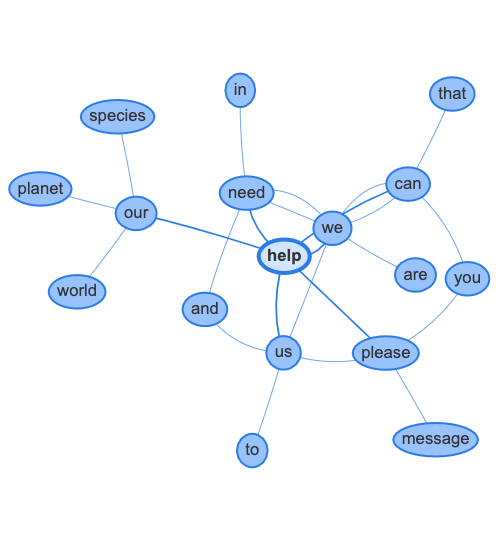
Figure 10. The un-expanded word network surrounding help.
The expanded network.
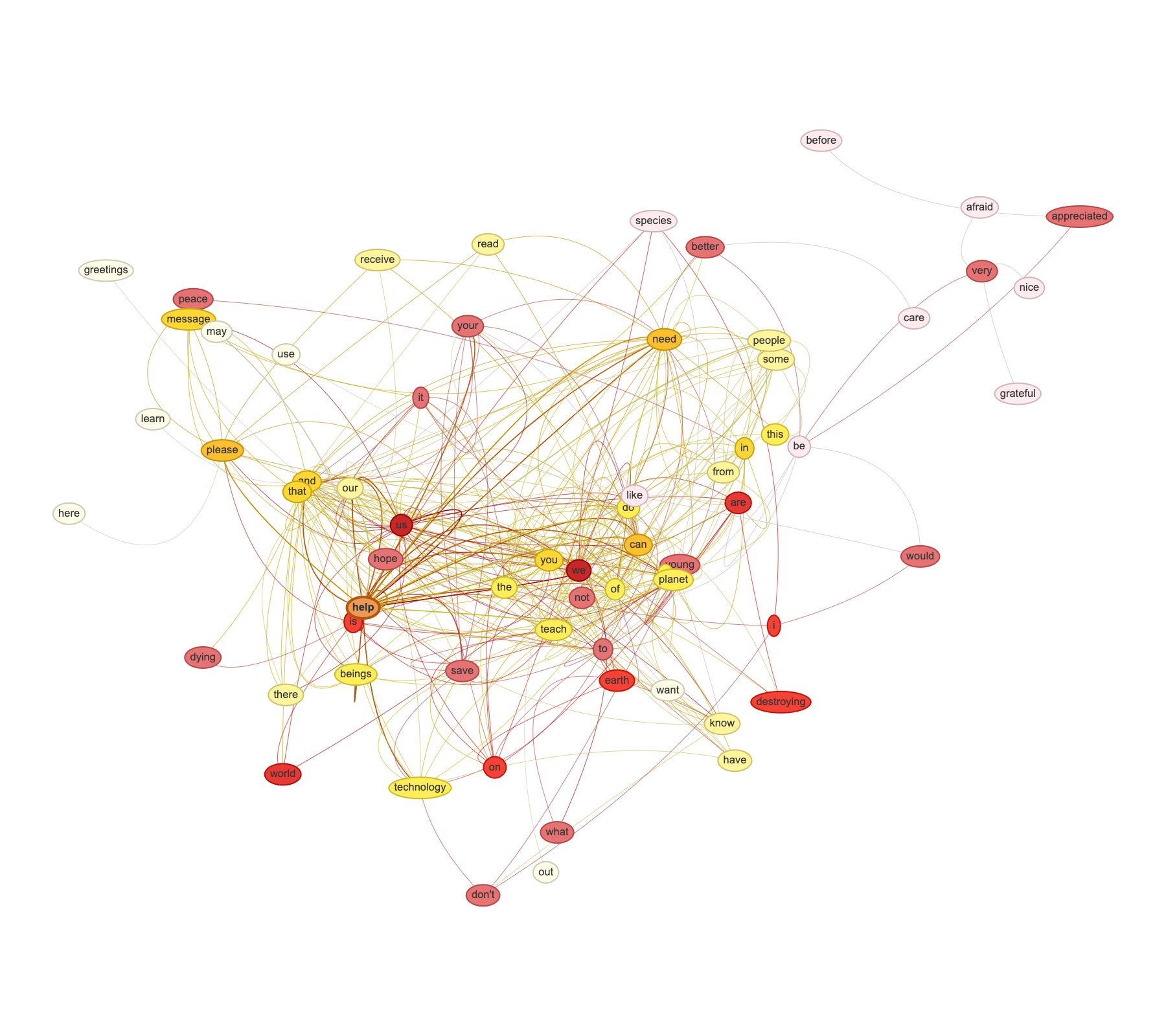
Figure 11. The expanded word network surrounding the word help.
In the unexpanded word network depicted in Figure 10, the words planet, species, and world are identifiable, as is the word need, among others. These associations provide indicators of the issues for which help is being requested, but remain somewhat non-specific.
In the expanded word network presented in Figure 11, more elaboration becomes visible. In this figure, the target word help is depicted in orange, while the words following it are depicted in lighter shades of red for each word-level away from help they are located. Similarly, the words preceding the word help are depicted in lighter shades of yellow as they are found at an increasing number of words away from the target word.
Comparing Figures 10 and 11, additionally associated words become apparent, such as destroying, dying, learn, teach, and technology (among others).
Reducing the meaning unit to only those sentences including help.
Reduction of the meaning unit.
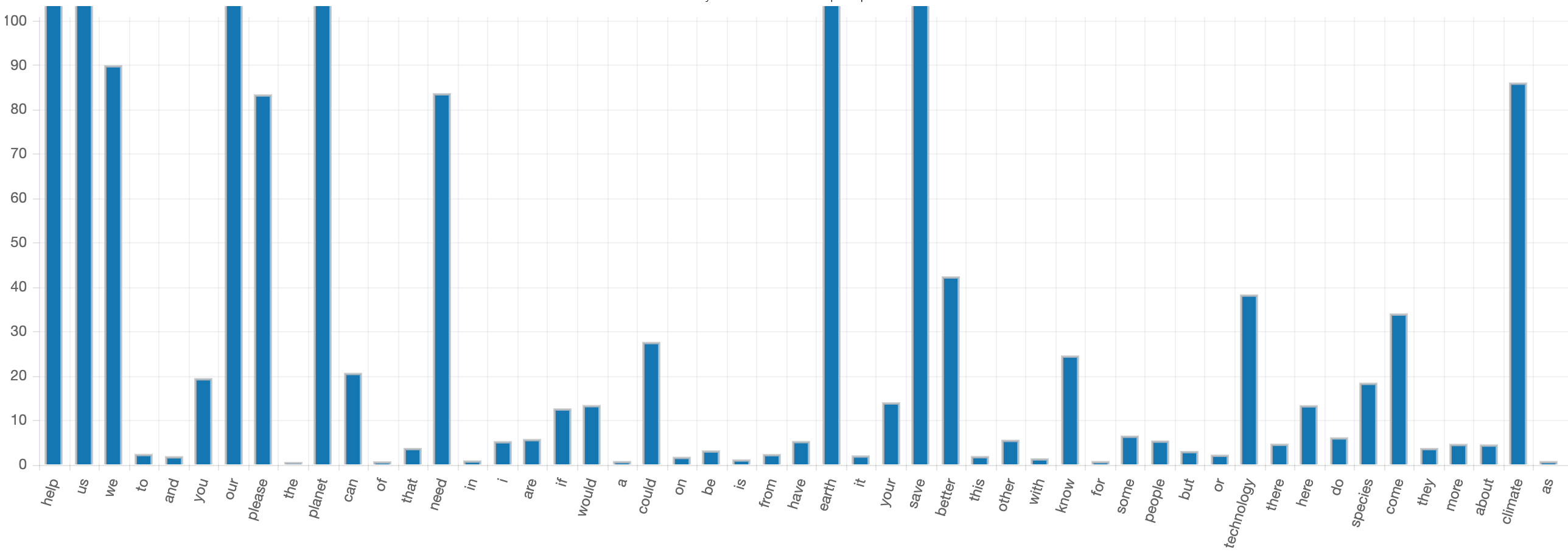
Figure 12. The most frequent words from sentences including the word help.
Figure 12 depicts the topmost frequent words found in sentences including the word help. By reducing the meaning unit in this way, the elaborations on please help us become more apparent, and readily explorable. Because the model statement is derived from the actual words used by participants, and this sentence-based meaning unit is a subset of the original unit of meaning as defined by each participant's entire response, the words please help, and the mood-related words us, we, to, you, and our are also frequent and similarly overrepresented in Figure 12. Likewise, in this chart the words planet, Earth, and know are also again overrepresented. However, additional words, including need, could, save, better, technology, come, and climate, also become apparent. Figures 13 to 21 depict several of these word networks.
-
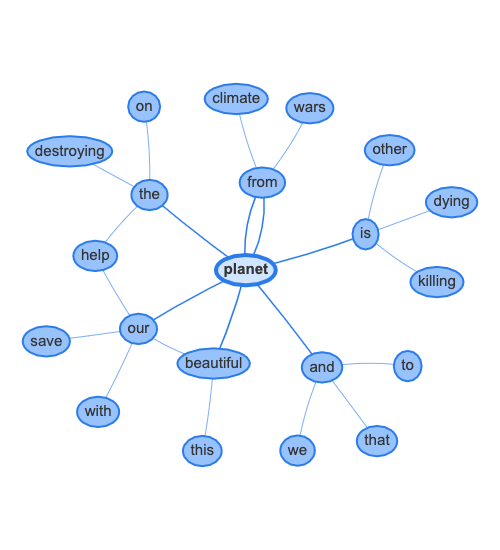
Figure 13. The word network for planet in sentences containing help.
-
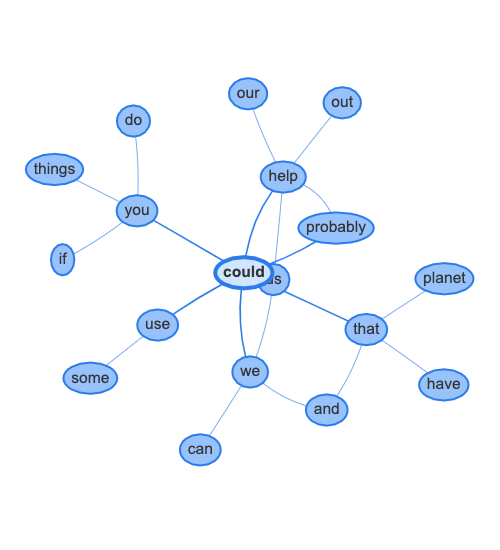
Figure 16. The word network for could in sentences containing help.
-
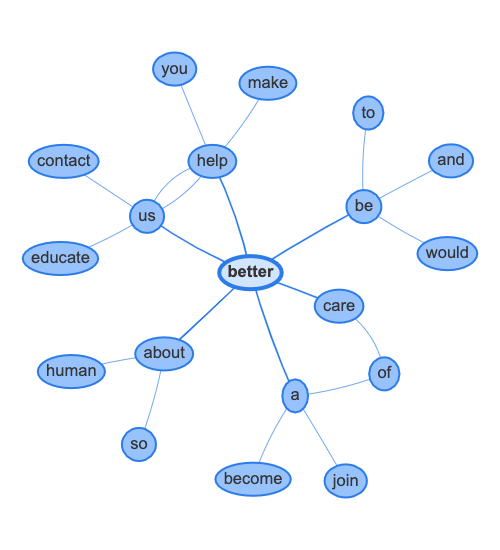
Figure 19. The word network for better in sentences containing help.
-
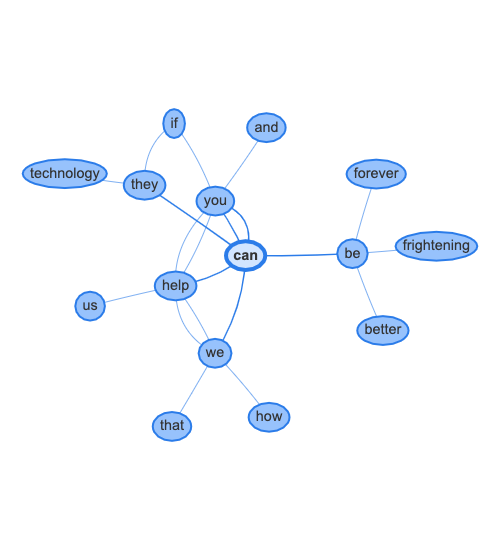
Figure 14. The word network for can in sentences containing help.
-
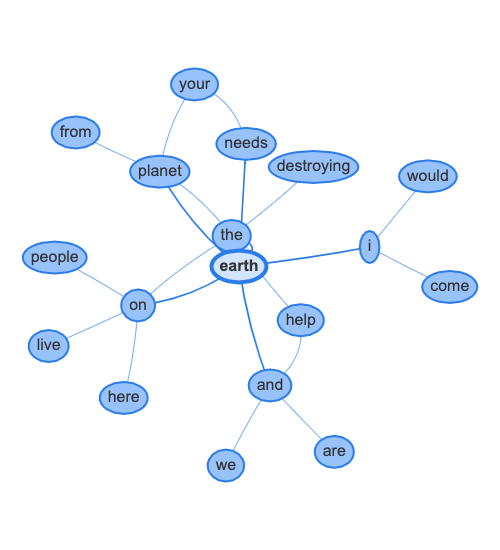
Figure 17. The word network for Earth in sentences containing help.
-
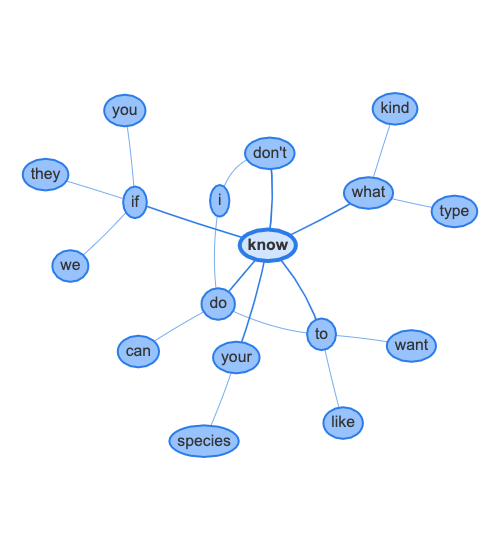
Figure 20. The word network for know in sentences containing help.
-
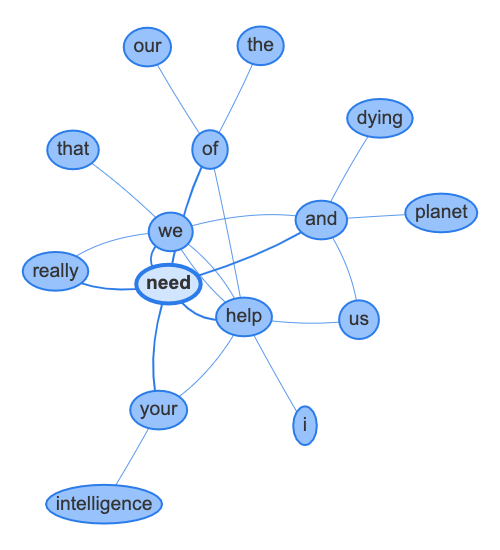
Figure 15. The word network for need in sentences containing help.
-
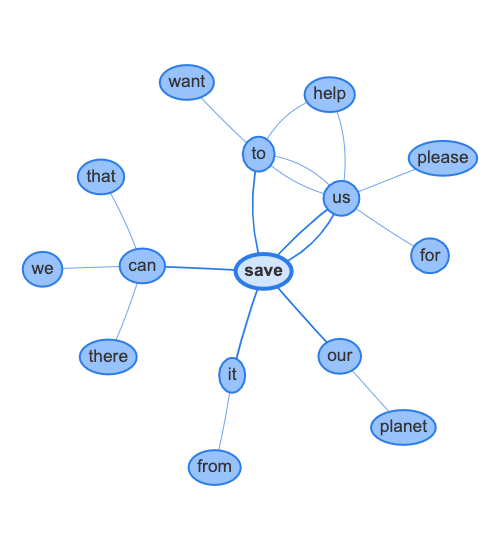
Figure 18. The word network for save in sentences containing help.
-
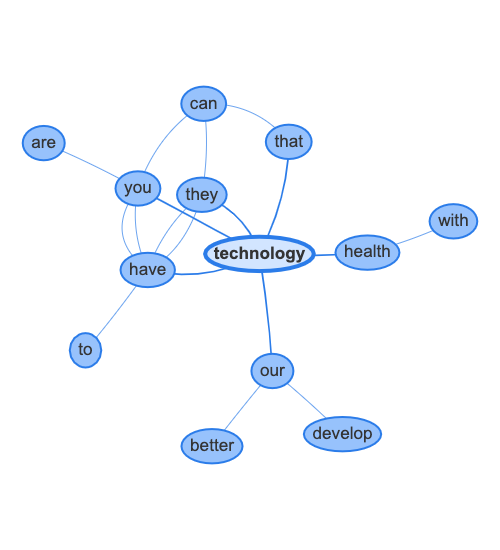
Figure 21. The word network for technology in sentences containing help.
Other, overrepresented words not appearing in the topmost words included: send, things, ourselves, understand, don't, killing, ask, maybe, universe, soon, dying, dark, advanced, beings, and environment, among others. Though less frequent, these words often further elaborate on the words presented in Figures 12 to 21.
Given the word networks and associations present in meaning units comprised of sentences containing the word help, the following model statements can be created to elaborate on please help us.
Please help us
…our planet is dying.
…we need your intelligence.
…we could use help fixing our planet.
…we are destroying the Earth.
…save our planet from climate change.
…better ourselves and our technology.
Other less frequent elaborations also exist, of course, such as we are killing our planet and each other. By elaborating on help through reduction of the meaning unit to sentences containing that word, we find that such help is generally requested to combat human-made climate change and environmental destruction, and to better ourselves and our planet. When combining this with the associations noted in the discussion on Figures 10 and 11, the expectation appears that such help will come through being educated or taught from a more advanced and intelligent species, and from learning about their relatively more advanced technology.
The interpretation.
Given the foremost model statements, panorama, and mood of the natural language analyzed in this survey, we find its contents to be informal communication between a collective self-identity as human and another being. That communication primarily involves an introduction with reference to our planet, followed by a plea for help and questions about knowing how the other being lives and experiences life on its world (with subsequent questions about that being's knowledge in general, as well as how to solve practical problems of existence). This is then followed by a greeting, and an indication that we mean no harm to the extraterrestrial intelligence.
The foremost model statements do not vary in their content across the people, places, and time involved in our survey, though some differences in complexity are apparent between genders. Most participants are comfortable with sending a message. While the content of the model statements does not appear to vary based on this comfort level, the length and vocabulary of the messages created by our participants does. Those who are uncomfortable with sending a message produce shorter and less complex messages, possibly as a result of their reticence.
Elaborating on the model statement, please help us, reveals that such help is primarily requested to resolve climate and environmental difficulties, for which our respondents feel that we are responsible. A secondary set of requests involves improving our knowledge and technology as a species, both in general and to again address planetary problems. The final theme arising in requests for help involves reducing human violence directed at other humans.
The horizon.
Our results are bounded by the people, places, and time in which they were produced. For example, our participants were drawn from Amazon Mechanical Turk workers located in the United States. As such, they may have certain characteristics or experiences that vary from that expressed by the typical person in this nation. These characteristics or experiences may, in turn, systematically relate to variation in thoughts about a given topic.
To counter potential limitations, we have utilized a high threshold for creating a model statement around a concept in our report. In order for a model statement to be created around a given concept, that concept must have been expressed at a rate that exceeded 20 times its typical rate of use in everyday English3. By our estimates, our sample likely includes approximately 55% of the total population of Mechanical Turk workers available in the United States during the time that the survey was available4.
The cut-off threshold of 20 that we used for our analysis makes it such that the confidence estimate for our results exceeds the total possible population of available Mechanical Turk workers available in the United States during the period of the survey. We are, therefore, quite confident that our results can be generally applied to this population, at least at this point in history4.
However, as an indication that the horizon of our results might in actuality extend beyond the current population, we encourage interested readers to inspect the results of publications by Vakoch et. al (2013), and Lower et al. (2011)6. Both of these publications report on the results from an international online survey conducted in 2009-2010, which asked participants what they would want to say to an extraterrestrial intelligence.
Vakoch et. al (2013, p. 137) lists and validates the top themes in the multinational sample, which greatly correspond to the model statements reported in this worldview. For comparison, the five most frequent themes found were, verbatim:
- We are humans of the planet Earth.
- You are alien to us, but you have know how.
- Hello and welcome.
- Please help.
- Peace, love, and friendship.
When the results of these previous publications are compared to this current worldview, a substantial amount of concurrence in the top themes and model statements becomes readily apparent. We conclude, therefore, that our worldview's model statements may indeed extend well beyond the horizon formed by the demographic, geographic, and temporal conditions of this current survey. It would appear that if given the opportunity, everyday people would call out to the stars for help to solve their environmental and social difficulties, and have been wanting to do so for at least the last decade.
Notes.
1Amazon's Mechanical Turk (mturk.com) is an online marketplace of individuals willing to complete short Human Intelligence Tasks (HITs) for modest payment.
2https://ravens-eye.net Though, since you're already here, you can click on Home in the menu at the top of your browser window to find out more about us.
3To derive our rate of use, we compare the proportionality of a word in the sample to the proportionality of that same word in our 4.8 billion-word corpus of the English language. Based on a nomothetic approach to the lexical hypothesis, the amount to which a word is overrepresented (i.e., found at proportions greater than 1.0) also expresses the degree to which that word is associated with the stimulus (e.g., our open-ended survey questions) by the participants.
4The cut-off threshold that we used for our analysis makes it such that our confidence in the generalization of our results exceeds the total population of Mechanical Turk workers in the United States. Current published Mechanical Turk population estimates indicate that such employment is transient and fluid. However, at the time of our survey, the best available estimates indicate an average likelihood of approximately 1,835 Mechanical Turk workers being available in the United States at any given time, and a maximum likelihood of 5,625 workers at any given time.
An overrepresentation score of 20 means that a given word is found in response to the question at 20 times its rate in the 4.8 billion-word background corpus of everyday English. Setting the overrepresentation cut-off score at 20 then, means that we do not create model statements from words with overrepresentation scores below this score. All else being equal, in order for a given word to be mistakenly overrepresented, we would need to acquire 19 times our current pool of respondents who never once use the word again.
This would mean acquiring 19,399 more respondents (1,021 x 19 = 19,339 + 1,021 = 20,420, or 20 times the original pool of 1,021 respondents), every single one of whom would have to refrain from ever mentioning the given word again. Given population estimates for Mechanical Turk workers noted previously in this footnote, this additional pool would be 3.4 times the maximum population estimate, and 10.5 times the likely population estimate of the total number of Mechanical Turk workers in the United States at any given time. Moreover, many of the words used to create our foremost model statements greatly exceed the inclusionary threshold of an overrepresentation score of 20. For instance, planet, Earth, and hello are found in our responses at rates in excess of 100 times their typical use in the background corpus. Therefore, the estimate of confidence for this survey greatly exceeds the possibility that the words used to create our model statements were overrepresented simply by chance.
5Eleven people did not respond with a message in their own words, instead copying text from the Wikipedia page on the Arecibo Message. One person responded with "n/a," and one person reported being less than 18 years old (1,034 - 11 - 1 -1 = 1,021).
6Vakoch, D. A., Lower*, T. A., Niles, B. A., Rast, K., & DeCou, C. (2013). What should we say to extraterrestrial intelligence?: An analysis of responses to "Earth Speaks." Acta Astronautica, 86, 136-148. doi: 10.1016/j.actaastro.2011.05.022.
Lower*, T.A., Vakoch, D.A., Clearwater, Y., Niles, B.A., &. E. Scanlin, J.E. (2011). What the world needs now: Identifying the relative degree of specific Maslovian needs and degree of species-level self-identification in interstellar messages submitted by a multinational sample. In D.A. Vakoch (Ed.), Communication with Extraterrestrial Intelligence. (pp. 341-353). New York: SUNY Press.
These publications also utilize quantitative phenomenology to produce their results, though the method was employed prior to the commercial development of Raven's Eye. They therefore utilize different and more restricted language corpora, a more general word-networking procedure, and multiple software programs. These differences may account for some of the modest variation in thematic content and order found by comparing the top themes delineated in those publications, and the top model statements presented in this current worldview.
*Lower is a cofounder of Raven's Eye.

